#first of all he's Fi defined like. obviously
Explore tagged Tumblr posts
Text
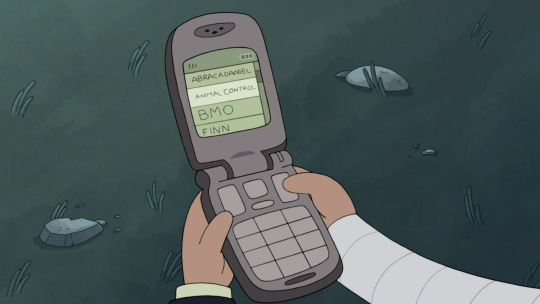
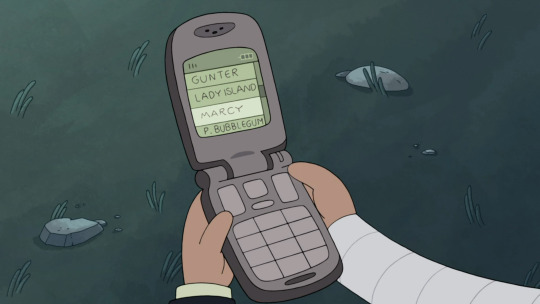
Honestly, first time noticing the names in Simon's contact list I was just like 'haha cute references' and didn't pay it much mind. But looking at them again, and really thinking about them. The Implications here, like Most Things About Simon's Life Right Now, are pretty tragic....
Like, Abracadaniel and Lady Island and Gunter (and BMO if you take into consideration the comic's continuity) are not Simon Petrikov's friends, they were Ice King's friends.
You know, like, yeah, everyone except Marcy knew Ice King way way before they got to know Simon. But at least with folks like Finn, finding out about Simon is a huge reason why he started being kinder and friendlier to him. And Bubblegum probably is only fond of Simon know in spite of him being Ice King.
But Abracadaniel and Lady Island liked Ice King without having any frame-of-reference or concept of 'Simon Petrikov' in their heads. They were Ice King's friends.
And Simon's phone is pretty distinctly, like, a realistic early 2000's cellphone. A total contrast to all the magical/sci-fi/cobbled-together looking cellphones everyone else in Ooo uses
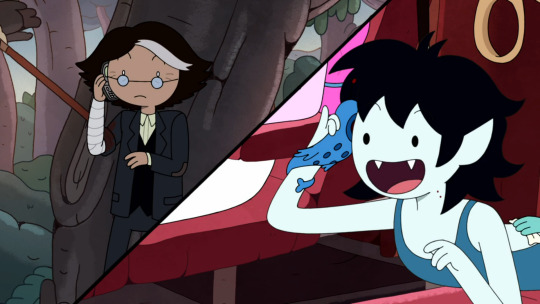
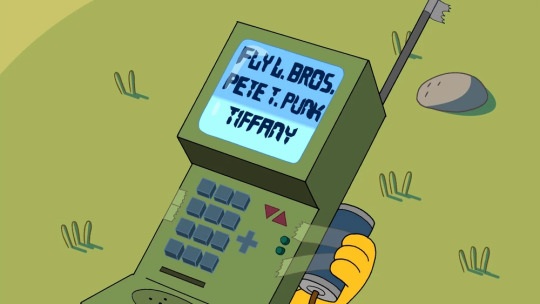
And Ice King himself, I'm pretty sure we've only ever seen him use either a normal-looking landline or the Bananaphone
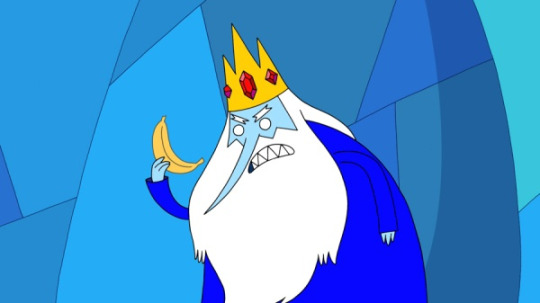
Not this ordinary Nokia-looking flip-phone, definitely.
So I'm assuming this phone was maybe found buried somewhere in the Past Room, or maybe was unearthed while they were preparing for that '20th Century Man' exhibition and Simon also takes it along for personal use. But either way, Simon had to deliberately put those numbers of Friends of the Ice King in his contact list.
It might be something as simple as having transferred the data from some of Ice King's old communication devices and then just... despite it all Simon just doesn't have the heart to delete these names. The same way you or I might not have it in us to the delete the numbers of friends of ages past or increasingly-distant acquaintances or dead relatives.
Or maybe Simon did try and preserve their friendship at first. Or maybe the friends did. And obviously it didn't work out.
I mean, I can kinda see maybe Simon getting along fine with Lady Island because IK was relatively Grounded interacting with her so maybe the change to Simon won't be that much of a difference to her. ....But that can also create problems if she has a hard time seeing the difference between Simon Petrikov and Ice King, that would really make him uncomfortable.
But there really is zero chance Simon managed to keep things going normal with Abracadaniel. A Wizard who originally bonded with Ice King because he saw him as a cool Wizard. Not to mention Gunter is currently a living incarnation of the very Crown that cursed Simon in the first place and a manifestation of Gunter's love of Ice King
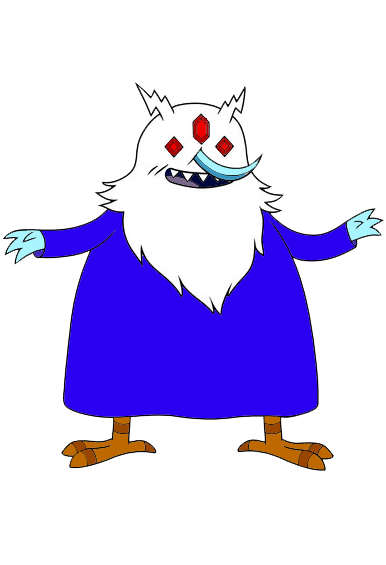
so... yeah, I think in Simon's current state any interaction he had with those two was unbearably awkward and just another thing that will make him miss being Ice King in a twisted way.
And yet... despite wanting so badly to define himself as distinctive and different from Ice King ("I didn't write those! Ice King wrote those!") and to not be reminded of him.... Simon still keeps all these people in his contact list.
#adventure time#atimers#adventure time spoilers#adventure time fionna and cake#fionna and cake#fionna and cake spoilers#fionna and cake series#fionna and cake show#at spoilers#simon petrikov#adventure time simon#simon adventure time
1K notes
·
View notes
Note
Hi, genuine good faith question if you'd like! How is TOS racist? It was my understanding that the OG Series was like, huge for equality in media?
I’m speaking primarily about the content of TOS itself, not its historical impact - I understand it had various historic firsts in terms of having characters of colour in respectable roles, which I’m not dismissing. My experience with the discourse on here surrounding the show is that people front-load these character representations as emblematic of the show’s progressive politics. Which, if we want to go that route, TOS was contemporary to the US civil rights movement, which provides us with a handy measuring stick to see how TOS actually grapples with race, not just the presence of characters of colour themselves. I'm going to be kind of defensive in this explanation, not towards you specifically, but because I have had this conversation with people online many, many, many times, and so any defensiveness on my part is in anticipation of arguments I know will come up as a result of making the basic claim that a show made in America in the 1960s is racist. I'm also going to be copy + pasting from an older post I've made on the subject since it's been a while now since I've watched TOS so some of the details are fuzzy.
Like okay, the premise of TOS is that the Enterprise, as an ambassador of Starfleet/the Federation, is seeking out new alien life to study. The Prime Directive prohibits the Enterprise crew from interfering with the development of any alien culture or people while they do this, so the research they collect needs to be done in an unobtrusive way. I think this is the first point at which people balk at the argument that TOS is racist or has a colonial conception of the world - the Enterprise’s mission is premised on non-interference, and I think when people hear ‘colonial’ as a descriptor they (understandably, obviously) assume it is describing active conquest, genocide, and dispossession. Even setting aside all the times where Kirk does directly interfere with the “development” of a people or culture (usually because they’ve “stagnated” culturally, because a culture "without conflict" cannot evolve or “develop” beyond its current presumed capacity - he is pretty explicitly imposing his own values onto another culture in order to force them to change in a particular way), or the times when the Enterprise is actually looking to extract resources from a given planet or people, I’m not exactly making this claim, or rather, that’s not the only thing I’m describing when calling TOS racist/colonial.
The show's presentation of scientific discovery and inquiry is anthropological - the “object” of analysis is alien/foreign culture, meaning that when the Enterprise crew comes into contact with a new being or person, this person is always read first and foremost through the level of (the Enterprise’s understanding of) culture. Their behaviour, beliefs, dress, way of speaking, appearance, and so on are always reflective of their culture as a whole, and more importantly, that their racial or phenotypic characteristics define the boundaries of their culture. Put another way, culture is interpreted, navigated, and bound racially - the show presents aliens as a Species, but these species are racially homogeneous, flattening race to a natural, biological difference that is always physically apparent and presented through the lens of scientific objectivity, as "species" is a unit of biological taxonomy. Basically species is a shorthand for race. This is the standard of most sci-fi/fantasy genre work, so this is not a sin unique to Star Trek.
Because of this however, Kirk and Co are never really interacting with individuals, they are interacting with components of a (foreign, exotic, fundamentally different) culture, the same way we understand that a biologist can generalize about a species using the example of an individual 'specimen'. And when the Enterprise interacts with these cultures, they very frequently measure them using a universalized scale of development - they have a teleological (which is to say, evolutionary) view of culture, ie, that all cultures go from savage to rational, primitive to advanced, economically simple to economically complex (ie, to capitalist modes of production). And the metrics they are judging these cultures by are fundamentally Western ones, always emphasising to the audience that the final destination of all cultures (that are worthy of advancing beyond their current limited/“primitive” stages) is a culture identical to the Federation, a culture that can itself engage in this anthropological mission to catalogue all life as fitting within a universal set of practices and racial similarities they call “culture.”
This is a western, colonial understanding of culture - racially and spatially homogeneous people comprise the organs of a social totality, ie, a society, which can then be analysed as an “object,” as a “phenomenon,” by the scientists in order to extract information from them to produce and advance state (ie Federation) knowledge. The Enterprise crew are allowed to be individuals, are allowed to be subjects with a capacity for reason, contradiction, emotion, compassion, and even moments of savagery or violence, without those things being assigned to their “race” or “culture” as a whole, but the people they interact with are only components of a whole which are “discovered” by the Enterprise as opportunities to expand and refine the Federation’s body of knowledge.
Spock is actually a good example of what I'm talking about, because he is an exception to this rule - unlike the others in the crew, his behaviour is always read as a symptom of his innate Vulcan-ness, where his human and Vulcan halves war for dominance in his mind and character. Bones (the doctor, one of the main cast) constantly comments on Spock's inability to feel things, that he is callous and unsympathetic, ruled by Vulcan logic to such an extreme that his rationality is a form of irrationality, as his Vulcan blood prohibits him from tempering logic with human emotion and intuition. Now you can argue that Bones is a stand-in for the racists of the world, that Spock proves Bones wrong in that he is able to feel but merely keeps it under wraps, that Vulcans are not biologically incapable of emotion but merely live in a socially repressive culture, but this still engages in the racial logic of the show - Vulcans are a racially-bound species with a single monolithic culture, and Spock's ability to express and feel 'human emotions' is the metric by which he is granted human subjectivity and sympathy.
And on the flip side you have the Klingons - a “race” that is uniformly savage, backward, violent, and dangerous. In the episode Day of the Dove, where Klingons board the Enterprise along with an alien cloud that makes everyone suddenly aggressive and racist (this show is insane lol), the Enterprise crew begins acting violent and racist, but the Klingons don’t change. They aren’t more violent than before (because they already were fundamentally violent and racist), and they don’t become less violent when the cloud eventually leaves (because they are never able to emerge from their violence and savagery as a social condition or external imposition - they simply are that way). Klingons are racially, behaviourally, psychologically, and culturally homogeneous, universally violent and immune to reason, and their racial characteristics are both physical manifestations of this universal violence as well as the origin of it. The writers and creators of TOS are explicitly invoking the orientalist idea of the “Mongolian horde,” representing both the American fear of Soviet global takeover as well as blatantly racist fears about “Asiatics” (a word used in the show, particularly in The Omega Glory where a fear of racialised communist takeover is made explicit) dominating the world.
This is colonial thinking! Like, fundamentally, at its core, this is colonial white supremacist thinking. Now this is not because TOS invents these tropes or is the origin of them, it is not individually responsible for these racial and colonial logics - these conceptions are endemic to Western thought, and I am not expecting a television show to navigate its way outside of this current colonial paradigm of scientific knowledge. I’m also not expecting an average person watching this to pick out all the intricacies of this and link it to the colonial history of Europe or the colonial history of western philosophy/thought. But this base premise of Star Trek is why the show is fundamentally colonial - even if it was the case that the crew never intervened in any alien conflict, never extracted any material resources from other people, this would still be colonial logic and colonial thinking. The show has a fundamentally colonial imagination when it comes to exploration, discovery, and culture.
I think a good place to end is the opening sequence. The show's first line is always "Space! The final frontier." I do not think the word frontier is meant metaphorically or poetically - I think the show is being honest about its conception of space as an infinitely vast, infinitely exotic frontier from which a globally Western civilisation (which the Enterprise is an emblem of) can extract resources, be they material or epistemic
264 notes
·
View notes
Text
Sentimonsters Vs Tropes
It's no secret that I hate the fact that Adrien is a sentimonster, but I figured I'd take a minute to clearly explain why it bothers me so much because I don't think that I've done that and I should. There's obviously the issue that he will never have true free will and that's deeply upsetting, but my dislike of this theory came long before canon made that issue clear, further fueling my hatred. My baseline dislike is routed in the heart of the theory and the tropes it's brushing up against.
There are two standard tropes that you usually see with something like the sentiplot. The first trope is the humanization of the outsider and the second is the questioning of what it means to be a valid living creature. Let's quickly define both of these.
Humanization of the Outsider
This trope takes some external group and presents them as bad. They are the irredeemable enemy who must be stopped at all costs, the lesser race who are fit to be nothing more than slaves, or some other inherent disparity that's just a base part of this world. Whatever the setup, the story then introduces a member of this external group as a key character in the story and somehow creates a connection between that character and the "good" guys. Through that connection, we come to learn that this individual is, in fact, not inherently lesser or bad or what-have-you. They are just as valid as the "good" guys. From there, we are forced to reassess our assumptions about every member of the external group. If this one individual isn't what we thought, then are any of them? For a well-known example of this, think Toothless from How to Train Your Dragon.
The point of this trope is to make people question the way they view others. To suggest that maybe you're viewing a situation through biased eyes. Is any group inherently bad/lesser or do you just not know the whole story? What have you been taught and why?
What Makes You Worthy of Life?
This trope is basically the inversion of the humanization trope. Instead of focusing on how we view others, it focuses on how we view ourselves. It says that you're valid no matter where you come from or who your parents are. That you are not defined by others or arbitrary catagories. For a well-known example of this, think of that Mewtwo line that people love to quote:
“I see now that the circumstances of one's birth are irrelevant. It is what you do with the gift of life that determines who you are.” ― Pokemon, The First Movie: Mewtwo Strikes Back!
Combo Attack & Variations
Before we circle back to Miraculous, it's worth noting that these two tropes are often used in tandem. A non-human or outsider may question if they're valid and, though that struggle, teach others in-universe to question their prejudice. You can also have variations such as the non-human or outsider viewing themselves as totally valid without being part of a larger group, leading to the type of discussion that you'd expect in the humanization trope even thought, setup wise, it's more in line with the validity trope. Star Trek: The Next Generation has several episodes about this one, mostly focused around the character Data. Heck, Stark Trek hits every one of these tropes at one point or another because they're incredibly standard Sci-Fi tropes. A large amount of Sci-Fi is all about philosophical questions! This brings us back to Miraculous.
Dunking on Miraculous
When you use a standard setup like the introduction of a non-human who is supposed to be seen as human, you are joining a vast canon of literature that discusses this topic, adding your voice to thousands of others, making your statement on humanity and personal worth. Or, at least, that's what I expect to see when you introduce this type of setup. The problem with Miraculous is that it doesn't add to those conversations. There is no discussion of Adrien's worth or the worth of any other sentimonster. If anything, Miraculous has so far spat in the face of these tropes. To show you what I mean, let's look at what canon has given us from two directions.
Direction One: What makes a sentimonster valid?
Their creator. Adrien was made to live like a human and so we must treat him as one. If a sentimonster wasn't made to be equal to humans? Then no worries, go ahead and destroy them! They don't matter because their creator - aka their parent - decided that they're worthless. The circumstances of their birth define their fundamental right to exist.
Direction Two: What did finding out about their sentistatus do to Felix and Kagami's perception of their own self worth? Does finding out a sentikids' sentiness status change how others see them?
Canon seems to have no interest in even acknowledging that someone might ask these questions. Felix has known what he is for years, but doesn't seem to have any hangups about it. He wants to ensure his freedom, but that's not unique to sentimonsters or saying something about his self worth. Once he has his ring and the peacock, his lack of true free will and the whole remote-self-destruct issue don't seem to bother him. You could replace his status with any sort of magical control and get the same plot because the plot is about acquiring macguffins and nothing else.
Even Colt's abuse is only used to make Felix a sad little uwu who can't be held accountable for anything and not as a setup to Felix questioning his worth. We see Felix called "monster," but Felix has not been shown to have taken that insult to heart. He doesn't view himself as a monster. We don't even learn about the monster insult until Felix is "good." The most I can say is that there is a vague sense that Felix probably views humans as lesser, but it's hard to be sure about that based on the actual text of the show even if the word of god is that Ladybug made Felix trust humans. So that's a bust on Felix addressing this issue even though he's the best character to do it. What about everyone else?
Kagami seems to learn the truth in the middle of season five and she's totally fine. Not really human? Not a problem! Her love life is far more worthy of attention. Make her a human who falls in love with a sentimonster and, once again, nothing changes.
Marinette is implied to learn the truth during Felix's play and has no reaction. The fact that she's Miraculous Ladybugged away sentimonsters and even tossed a few in the sun doesn't appear to even cross her mind. The only impact this has on her is that she now has more secrets to keep from Adrien. Her view of him, Kagami, and Felix has not changed.
We don't even get Nathalie or Gabriel reacting to the idea of destroying sentimonster! For fifteen years, the only sentimonsters they've dealt with are Adrien, Kagami, and Felix. They appear to see these three as real human children and yet they have no problem switching to using other sentimonsters as canon fodder. If anyone should have reacted strongly to the death of sentibug, it's Gabriel because Nathalie is wielding the power to poof away his son and she just showed a total lack of regard for what is supposedly a fourth valid sentimonster, but we get nothing.
Given all these tepid non-reactions, I guess that the audience is not supposed to care about the fact that Adrien was the only character with no hopes or dreams in Wishmaker. That meant nothing about his worth or psychology! It was just a bit of fun foreshadowing! He's a real boy because his mommy and the writers said so. No greater discussion is needed.
What's the show's actual message then?
Now, do I think that Miraculous was trying to give us baby's first eugenics lesson? No. Absolutely not! This is, at best, incredibly clumsy writing that is trying and failing to tell a moral that I truly can't figure out. At worst, the sentiplot shows us that the writers have a fundamental lack of curiosity. A complete disinterest in using their massive platform to say something of value. They are here to shock audiences with poorly setup twists and nothing else. Whichever path you pick, it's not a good look.
I truly love these tropes and grew up consuming media that played with them. They have positively shaped how I view the world. That's why I find Miraculous' handling of this topic so incredibly depressing and upsetting. The problem is not that Adrien is a sentimonster. It's that he was made into one - robbed of his freedom and humanity - for nothing more than shock value. It's that other, "lesser" sentimonsters are being treated as disposable by one of their own kind. It's that there is no greater lesson here or, if there is, then it's going to be told in a way that completely fails to connect with the audience due to the show's terrible pacing and inability to use the type of focus you need to tell a coherent arc.
These are the writers who had Adrien give the high road advice at the beginning of season three and then didn't revisit that issue until the end of season five without so much as a flashback to remind viewers what the heck he was talking about. Rare is the viewer who can follow that plot and I don't expect the sentiplot to be any better assuming that there even is going to be a plot. If there is, then I already hate it! I don't want Miraculous discussing hard topics with superfans and no one else. I want it having those discussions in a way that the intended audience can follow. If it can't do that, then it never should have tread on such morally complex ground.
#ml writing critical#ml writing salt#senti salt#You could also go the Ella Enchanted route with breaking free of controlling families via a curse but I doubt we'll get that either#It truly feels like Miraculous has nothing of value to say so why should I bother to listen?#ml's wacky morals
60 notes
·
View notes
Text
Say whatever you want about the black and white anime, but the one thing i will always stand by is that IRIS AND CILAN WERE NEVER PART OF THE PROBLEM!!!!
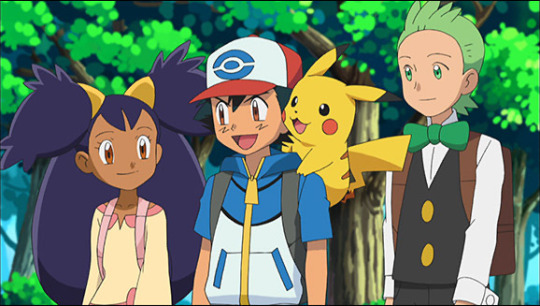
i did a full watch of the bw series a few weeks back, and the main 2 complaints i had about it were ash’s pokemon (he caught too many and most of them didn’t get enough screentime as a result) and team rocket (they were like barely there and didn’t even do the blasting off gag until the last season i think)
but for me the best parts of it were iris and cilan!!! i was kinda expecting them to be annoying cuz of all the hate they got, but i was pleasantly surprised at how enjoyable they were.
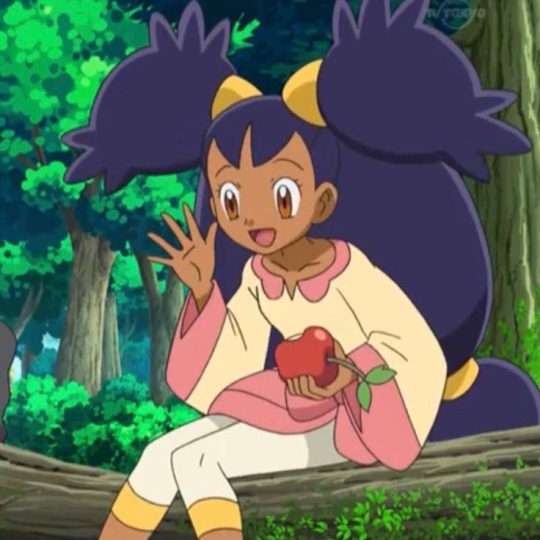
first off, i am the number 1 iris defender. all the posts i see that complain about her say the same thing everytime: “all iris does is say that ash is a little kid!”
well, as someone who’s binged the entire unova anime in like a week and a half, i can say that there is so much more to her. but for one, she doesn’t even say that ash is a kid as often as you might think. she mostly says it in the first few episodes when she first met ash. for the rest of the series, she’ll occasionally say it in passing, but it is not her one defining trait. while there are a few instances where i thought that it wasn’t warranted, there are plenty more times where ash was being big dummy and deserved it.
what people seem to forget about iris is that at the start of ash’s unova journey, iris is practically a new trainer. her axew is at most only a few weeks old, and her excadrill, while strong, hasn’t battled for who knows how long after being brutally defeated by drayden’s haxorous, leaving it in a state of shock. so obviously, she isn’t going to be the most experienced trainer out there.
iris grew up in the village of dragons, which as the name suggests, is a village inhabited by various dragon type pokemon. having spent her whole life surrounded by dragon types, iris has made it her dream to become a dragon type master. while at the beginning of her journey, she’s just with her axew, she over time has several encounters with dragon type pokemon, all of which help her better understand how to communicate with dragon types.
in one episode, she helped a druddigon out from a trap set by team rocket, while everyone else assumed it was rampaging out of anger. in another, the gang were helping out at a pokemon daycare, and in it was a deino, who was extremely shy. it’s trainer hadn’t returned for days after they said they would (the trainer ended up getting lost in a cave) and it was beginning to refuse to eat due to its anxiety. and what did iris do? she stayed with the deino the whole night, helping it relax in a place it wasn’t familiar with. it’s episodes like these that show that she’s not a one dimensional character, and like the rest of ash’s companions, she has character development.
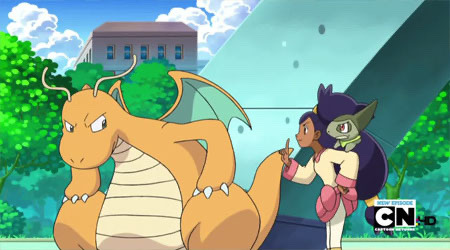
but what helped fully flesh out her arc was when she caught her dragonite.
unlike axew, who was by her side from the beginning, she and dragonite did not get along immediately. dragonite was stubborn, wouldn’t listen to iris, and had its own way of battling. in order to become a dragon master, she would first have to understand dragonite. the trust that was built happened really slowly, but she did get there. by understanding a pokemon as troubled as her dragonite, iris would then be able to reach out and soothe her excadrill, making it confident enough to battle again, and help axew evolve after her journey with ash ended. and i think that was a solid way to end her arc until pokemon journeys, where offscreen, she fulfilled her dream as a dragon master and became the champion of unova.
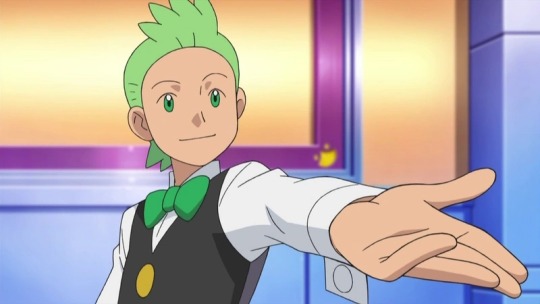
now onto cilan.
cilan doesn’t get hated on nearly as much as iris, he’s more or less just forgotten about. so while i was expecting to hate iris when i first started watching, i had zero expectations on cilan. and tbh, i think he’s my favorite traveling companion?? if not than at least top 3.
cilan is the oldest of three siblings, and he first met ash and iris when ash came to battle at the triplet’s restaurant/gym. usually, the challenger only battles one of them, but ash was the first person to want to challenge all 3 brothers. when it was cilan’s turn to battle, he assumed that he would win due to him having the type advantage (ash choosing to battle with oshawott against cilan’s pansage)
well, ash won. and a few episodes later, cilan asked if he could join ash on his journey. the reason cilan wanted to come along was because he saw a new side to pokemon battling that he wanted to better understand.
something about cilan is that while he is a gym leader, he doubles as a pokemon connoisseur. a connoisseur is someone who makes critical judgements in fine arts or matters of taste. for cilan, he analyzes the bond between trainer and pokemon. and during his battle with ash, he evaluated his and oshawotts bond based on their battle. and he dug INTO ash, almost outright insulting his capabilities as a trainer, due to his assumptions from ash using a water type against a pansage.
but the thing is, cilan was wrong. in the end, oshawott ended up winning with ash’s strategy and support.
he fully expected to win, and was given an entirely new perspective of battling after seeing ash pull through. like cooking, pokemon battles aren’t just about type advantage and throwing moves out. it’s about thinking outside the box and trusting your pokemon, which ash accomplished by having oshawott use its scallchop to deflect a bullet seed attack. wanting to become a better trainer and connoisseur, cilan tagged along to gain a new understanding between trainer and pokemon.
and outside of his arc, cilan is just a genuinely fun character!!! did you know that along with being a pokemon connoisseur, this man is also a fishing, cooking, detective, judge, and film connoisseur??? and he can cook!! (EDIT: people are mentioning that he is also a train connoisseur!!! sorry :( i forgor)
cilan is shown to be more composed with his emotions than the previous traveling partners ash had. he also plays a mediator role whenever ash and iris bicker. and remember, cilan is the oldest sibling of 3 triplets, so he’s likely had to play mediator countless times if his brothers ever argued. ash and iris also seem to have a sibling-like bond, so their clashing was probably similar to what cilan faced before with cress and chili.
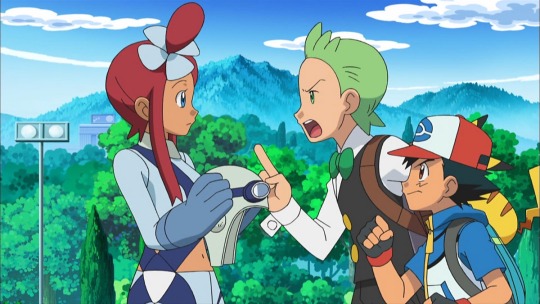
as i said, cilan is much more patient and gentleman-like. so the few moments where he genuinely loses his shit leaves a stronger impact.
the most notable example was with skyla, who instead of fulfilling her gym duties, played out battles in her head, and made her own judgements on if she could win a battle or not. this lead to challengers either being pushed away without a chance to battle, or given a gym badge without deserving it.
now cilan, who is a gym leader, sees this as a disgrace. it goes against everything a gym leader is supposed to do. skyla was lazy, arrogant, and wouldn’t do her job, which set him off. while he did lose against skyla, it was a big character moment to try and defend his honor as a gym leader.
overall, cilan is soooooo cool you guys don’t get him the way i do!!! i am the number 1 cilan fan!!!!
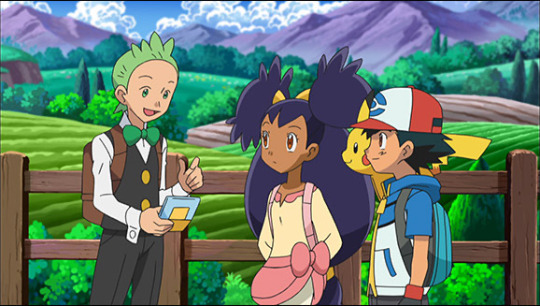
i think the reason people complain about iris and cilan more than any other companions ash had is because they were different.
iris had a completely different goal than everyone before her, it was a complete 180. she had zero interest in contests or performing, her dragon master dream was brand new in the anime. additionally, her relationship with ash was more like siblings than best friends, which likely made some viewers think their bickering was annoying.
and cilan. poor guy didn’t even have a chance from the start. not after brock was around for like a billion seasons.
overall, the black and white anime does have its problems, as does every pokemon anime. but leave iris and cilan out of it THEY ARE INNOCENT PARTIES :(
#pokemon#pokemon anime#pokemon journeys#pokemon iris#pokemon cilan#ash ketchum#pokemon black and white#unova region#unova#character analysis#analysis#rambles
133 notes
·
View notes
Text
Ten years of Whouffaldi
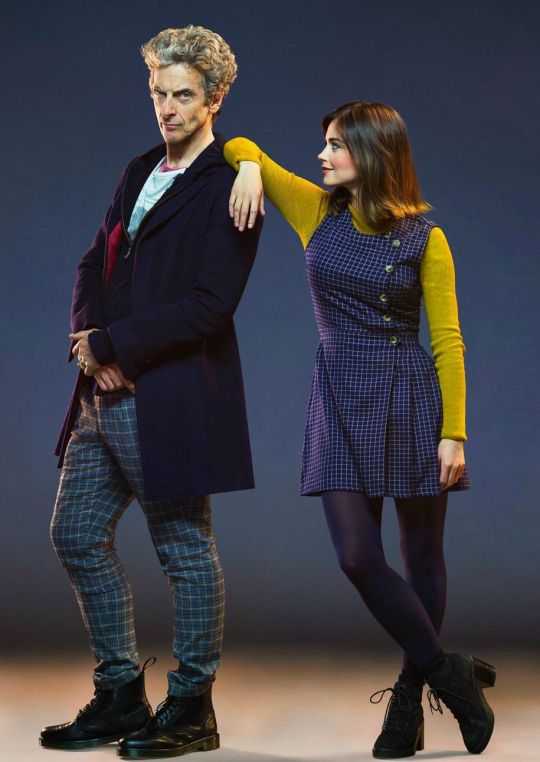
My word, where did 10 years ago?
Ten years ago on Aug. 23, the episode Deep Breath launched the remarkable era of Peter Capaldi as the Twelfth Doctor (or true Thirteenth if you want to annoy some people).
And it was the true launch of one of the most interesting romances in sci-fi (friendly reminder that Peter, Jenna Coleman, Steven Moffat, writers and directors have all in some way or another confirmed that this wasn't fans watching with "ship-coloured glasses" - it was canonical. Regardless how some fans and even media have tried - as recently as a few days ago - to pretend it didn't exist.)
I do think it was not intended. It cannot be denied that a lot of people consider there to be an age-gap limit in romances, real-life and fictional, even when both parties are consenting adults. So when Peter replaced Matt - and no one can deny Clara had the hots for Eleven because she flat out says so, several times - they obviously planned on a return to the First Doctor-Susan dynamic with Capaldi (or maybe more accurately Third Doctor-Jo Grant, since Three low-key held a flame for Jo, since Twelve would still remember how he felt as Eleven, plus Three was "Capaldi's Doctor"). But due to the fact Peter and Jenna had such intense chemistry (to this day some fans remain convinced they had a real-life romance, which is not something I ever subscribed to), coupled with the decision to shoot the first episodes of the season in order of broadcast, you can see Moffat and his writers pivoting in real time as they adjusted to the fact that - with no disrespect to Samuel Anderson - Danny Pink was never going to be the next Rory Williams. This is most in evidence with Listen defining a future for Clara and Danny that was definitively retconned by Danny's death in Dark Water.
I know the Capaldi era was not everyone's cup of tea. Season 10 in particular did not age well for me, mainly because it was clearly "one season too many" for Moffat and Capaldi himself seemed to "check out" after a fashion when it became known that the next producer wasn't planning on keeping Twelve around. And if we're going to harp about falling ratings for the show in recent years, Peter never attained the same viewership levels as Matt or David. But for me, Seasons 8 and 9 were - a few off points notwithstanding - the best of the modern era and easily rank alongside the Pertwee years as some of the best this show ever had. (I stopped watching after Season 10 - but having spoken to people whose judgement I trust, I don't think anything that followed is likely to have rendered that statement outdated.)
But I appreciated the more mature approach to the show. Yes, I know DW always was at its core a children's show - though upgraded to family show over time. But having the Doctor and Clara having a mature conversation at the diner, the Doctor inviting a villain to have a drink with him (the closest the Doctor ever got to being James Bond), Clara freaking out about being called a control freak (not to mention her perfect "Nothing is more important than my egomania!"), the fact the episode confirmed that the Doctor did look upon Clara as his girlfriend when he was Eleven, and the fact the episode walks up to ageism and pops it in the nose with Clara being upbraided by Vastra for being ageist because of Twelve no longer being the young man Clara fell for ... all these add up to a remarkable episode and likely the strongest debut story for a Doctor since Spearhead from Space.
Deep Breath also marks the last time we saw the Paternoster Gang on screen. Having praised Moffat for Whouffaldi, now time to aim some criticism his way - he set up a perfect spinoff series (Neve McIntosh is one of my favourite actresses not named Jenna Coleman) and yet never followed through. Say what one might about RTD, we'd have gotten 4 series of Vastra, Jenny and Strax had he been in charge. Big FInish doesn't count though I'm sure Neve and Dan Starkey appreciated the fact they didn't need to put on the makeup all the time! LOL
So happy 10th anniversary to Whouffaldi!
80 notes
·
View notes
Note
I came across your Jonathan in Hellsing posts and read and reread them enough times to burn them into my brain. The ideas you come up with are fantastic! But I was wondering if you had any thoughts on a Jonathan vs Anderson dynamic? Not necessarily physically fighting (though they definitely could) but like, in regards to their morals, relationship with god, and interactions with Dracucard.
(Ps. Obsessed w your Dracula sequel book and I hope it gets made into a movie that remains true to the characterizations you write and reshapes how the collective public views the characters forever!)
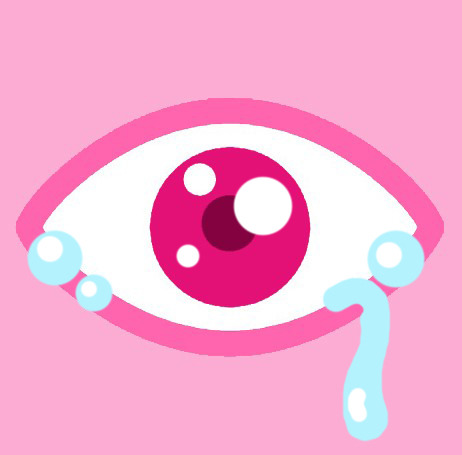
Thank you, this will sustain my gremlin of a writer ego for days
Jonathan and Anderson would have an interesting dynamic. Naturally they have to wind up in opposition if Jonathan's nominally on Team Hellsing. Anderson is fighting using holy magic and sci-fi/Christ sorcery-based regeneration and strength: Cool! He's using all of that to slay monsters: Cool! He has no filter when it comes to what he deems a 'monster,' no matter their actual innocence or level of humanity: Not Cool. In fact, it likely triggers a very specific flavor of ire Jonathan had to swallow back after seeing a certain Wafer burn.
(God is love. But that love is conditional. A truth that holds across the multiverse, apparently.)
((Cue the ringing of steel against steel. Because they've got to get into some kukri versus bayonet action.))
Actual confrontation has to happen when Jonathan either witnesses some arbitrary zealot-edged murder or he jumps to defend Seras or others from his pouncing. Anderson probably lumps Jonathan in with Alucard and Seras' situation at first--up until he learns that the only scar on Alucard's person, the fresh red line over his brow, came from Jonathan.
"Stole some sacred blade for him to play with, did you?"
"Oh no." A grin from Alucard, delighted to tattle. "A shovel spade. Just to prove a point. I do believe he might put us both out of the job before long. He doesn't need any specific toys to play this game. It's all him, Anderson. God picked a favorite whether he likes Him or not."
(And it wasn't you. He may put me down before you ever get the chance. Ha.)
((Notably he never defines what 'god' he refers to, but this framing twists the knife in Anderson better as well as making Jonathan a bit twitchy. It's complicated.))
Anderson takes this. Weirdly. He doesn't have quite the same 'Only I can do X! Only you can do Y!' fixation that Alucard seems to have about someone special~ doing the deed of killing him/being his equal et cetera. His whole deal is an obsessive need to Slay the Monsters. So he looks at Jonathan, sadly Protestant (probably? still? again, complicated), but obviously roiling with reflexive Hate for Alucard, possessing the ability to actually put the overpowered fucker down, and not doing it. Why?
"What is it they have on you, lad? Who has your leash to keep you from doing what comes natural, eh?"
Another clang.
"He's on a leash," said like lead. "He's being put to work for," bitter, bitter, bitter, "a greater good. And the sins I hate him for are long dead."
Sins slightly askew from those he recalls in his history. Van Helsing--no, Hellsing--would not let them slay Dracula back then. Enslaved him instead. Made a thrall of the one who wanted thralls. It is...somewhat uneasy to think of. Enslavement is a position far worse than destruction; it's the same way the Count meant to prey on them. He doesn't like it.
He hates Dracula. He is nauseous in Alucard's presence. But still. He does not like this. Yet where else is there for a time and universe-displaced Victorian cryptid to go?
"That power was given for a reason. Use it, lad. Put it to work against the foul things it was made for. Iscariot's got room for your like if you only repent and turn that knife the right way."
"My life was saved more than once by faith and by the faithful as you know them," Jonathan admits with a bow. "God is love," under his breath.
"That He is--,"
Slice.
Blood spills. The wounds do not heal, the bayonet cannot be gathered up in either shaking hand.
(This Power wounds monsters.)
"No. My god is Love. I have seen your God's love in action. I have been shielded by it and seen it betray the most virtuous soul in Creation. I cannot put my faith in anything so fickle. Especially not in you, who would murder a girl for her sharp teeth or strangers who dare to point out you have acted against a mutual peace. Go home and pray the pain away, Father. Now, or you will not leave with all your pieces."
Anderson exits. Alucard is going to combust out of sheer glee. Iscariot is put on alert alongside Millennium, both groups getting cagey about the concept of new unprecedented competition. Iscariot doesn't like Hellsing having another anti-supernatural ace up their sleeve and the Major and company hate the thought that someone else might have a chance at putting Alucard down (if the bat bastard allows it; he's waiting for Jonathan to juice up as a weightier cryptid for a proper throwdown).
In the meantime, Anderson ponders his cut arms, slowly healing as an ordinary man's would. He shoves Jonathan back on the same shelf as Alucard. Another monster in need of slaying--a blasphemous one of a different make. Some pagan divinity must be at his shoulder. No other. No other.
His arms ache.
#I love putting Jonathan Harker in situations so much#jonathan harker#dracula#alexander anderson#alucard#hellsing
21 notes
·
View notes
Text
The Rocky Horror Picture Show Review
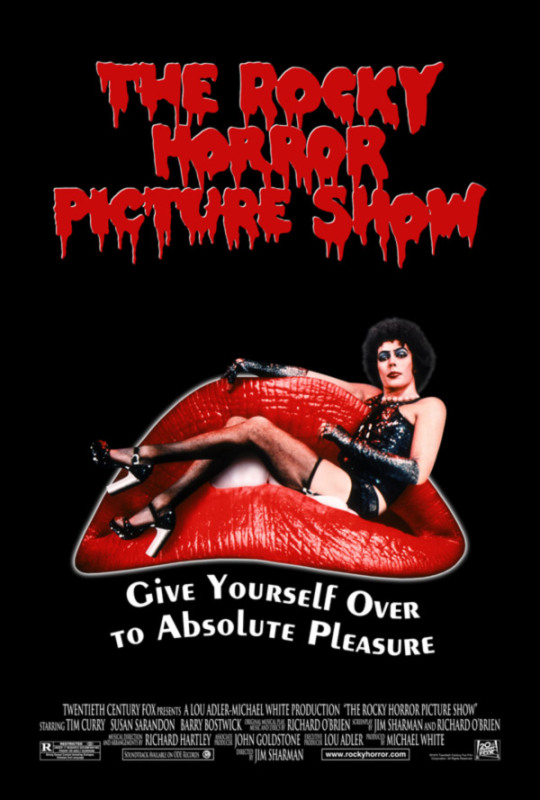
God, you haven't seen this either? Have you watched ANY movies that didn't come out in the last ten years? Yes, my film history is filled with blind spots, but look on the bright side! I can tell you what I think about it in a modern retrospective kind of way!
What did I know about RHPS before watching it? Well, I remember playing The Time Warp on Just Dance 4 a lot. I saw the clip of the Sweet Transvestite song when I was probably too young to watch it. And I heard this movie was the pinnacle of so good it's bad. My friend Mary from the Video Booze podcast (I know you won't be reading this but HIIII MARY! Fuckin' name dropper over here.) loves the movie and is constantly telling me about the history and impact of this movie, so I went with her and my other friend/coworker (I know you won't be reading this either but HIIII! What, you aren't gonna tell us their name?) to see it. And well...
What's The Movie About?
It's astounding... Time is fleeting... Madness... Takes it's toll. But listen closely... Not for very much longer. I've got to... Keep control.
I REMEMBER Roan we don't have time to do the whole song. Aw...
What I Like.
THIS MOVIE IS FUCKING GREAT!
First of all, I like the story. It kinda steals from a bunch of classic horror movies in a very surface way. Like Doctor Frank-N-Furter is obviously a parody of Doctor Frankenstein, but he kinda acts like Dracula with all these people under his (sexual) thrall. Not to mention he's from Transylvania. But in a hilarious twist (Spoilers) TRANSYLVANIA IS A GALAXY IN THE MOVIE. THE TRANSYLVANIANS ARE ALIENS COMPLETE WITH SILVER AND GOLD OUTFITS AND LASERGUNS. It's so fucking funny, I absolutely loved it. This movie had me rolling in the aisles laughing. More to the point of the story, even though it heavily borrows from classic horror and sci-fi, it DEFINATELY is it's own thing. Doc Frank is such and iconic character and performance, I was really surprised that it was Tim Curry's first role in a movie! Admittedly he was playing the role on stage for a while, but stage and movie acting are two different things with different levels of elaboration. Everyone reprises their roles from the play, and they are all great. I STAN RIFF RAFF! His actor switching between two extremely different voices was so impressive!
And the music! HOT PATOOTIE BLESS MY SOUL! I REALLY LOVE THAT ROCK AND ROLL! Stop just singing every song! NO! THEY'RE ALL GREAT! I love musicals, especially ones with some darker themes. RHPS has some overt stuff like cannibalism, but the subtle storytelling implying Doc Frank's history as a concentration camp survivor is insane. Honestly, if Mary hadn't pointed it out I don't think I would have noticed. Also, I love rock and roll music! I was actually kinda impressed on how much storytelling was done in the lyrics of the music, because listening to most of them isolated, they just sound like songs! As much as I like them, there is a distinction between song written to be just listened to in isolation, and a song written to be part of a bigger story. RHPS has some songs that only really work in the context of movie (slash play) but The Time Warp, Hot Patootie/Bless My Soul, as well as a few other I can't think of of the top of my head work extremely well in isolation as well and perfectly slot into the storytelling of the movie.
This movie is so goddamn cool you guys.
What I Didn't Like.
Literally my only complaint is that the ending is a little too long. Like a skoosh. Mary told me the version we watched had one extra song stapled onto the ending, and the theatrical cut is much cleaner. So there's that.
Final Summation.
I think everyone who told me this movie is so bad it's good was too straight and dumb. Hey! This movie is actually, legitimately, really really fucking good! I think it may have became one of my favorite movies ever. The music, the queerness, the acting and story, it's all fucking perfect. Check it out if you like anything remotely related to this movie, old horror, musicals, queer people, cross dressers, rock and roll, fucking... Charles Atlas. Rocky Horror Picture Show is SO GOOD!
It's just a jump to the left.
AND THEN A STEP TO THE RIIIIIIIIIIGHT! Oh just end the review down already.
9 notes
·
View notes
Note
Umm hi you dont have to answer if you want. Can i maybe hear your thoughts on Nonagon Infinity? You've kind of made me realize that although the songs flow together so deeply, I've still been seeing the subject matter of each song as like, individual to each other. I'm curious what you think of the album as a whole.
oooh yeah, such a fun album - I think I felt similar the first few listen-throughs but now I do get more of a sense there's more like... 4 sets of 2 songs that feel connected and 1 that is just kinda hanging out there.
lyrically I don't know if Robot, Stop and Big Fig Wasp have much in common, but the wasps in the first song's music video insinuate some commonality. Same with Gamma Knife and People Vultures.
Evil Death Roll and Invisible Face's music video both have references to a crocodile, Wah-Wah and Roadtrain are both about the devil.
and Mr Beat is there. hahahaha
this has a lot to do with my feelings of the gizzverse being less of a single continuity and more of an interconnected multiverse where there can be parts that are more post-apocalypse dark sci-fi, or more of a high fantasy vibe, a psychedelic mixture of sci-fi with magical elements or using concepts from the Christian mythos.
In the same vein there isn't a straightforward story connecting all 3 parts of the MOTU album, I don't think they need to be explicitly read as one story - but there are decidedly links. Most obviously being the same wizards from Gamma Knife appearing in Invisible Face.
And as I said, I don't think it's a coincidence either that Roadtrain swings back into Robot, Stop - with both tracks having a mechanical focus.
I've heard whispering that Jason Galea was going to make a music video for the full album that never happened, one can only speculate what else might've been drafted up for that. Even then, I do think what's there already gives us a lot to think about.
eg. we have Han-Tyumi's first appearance (I believe!) and we see him in this factory under the ocean creating these mechanical wasps. We can sort of see the music video alluding to what happens in MOTU - Han-Tyumi is betrayed by his creation somehow, the mechanical wasps multiply out of control and create an enormous wasp to confront him. Han-Tyumi goes berserk and attacks it, then it retaliates.
considering a lot of the lyrics in Robot, Stop are about the physical limits of one's body, maybe the wasps were designed to help Han-Tyumi? He has quite a bit of compassion for animals and probably sees a lot of himself in colony insects that work hard and build things. Maybe he didn't even intend to freak out and attack the big wasp, it just unfortunately alarmed him.
Big Fig Wasp continues this thread, I think we start to see Han's conflict about his relationship to nature. We can feel it evoked in the imagery of biting into a fig with a wasp in it. Having a hornet in his throat. He's cognisant of the negative impact everything is having on the environment but still feels helpless to stop it.
but also, "did your God know / insects grow in my pome?" almost sounds cautiously optimistic. Maybe there's still a chance of something growing, it could also be a metaphor for the idea itself being planted into his head like a parasitic wasp.
Road Train is also interesting in this context of starting the cycle of infinity anew, the head of the ourosboros returning to bite the tail. It evokes that sort of industrial, apocalyptic feeling that defines Han-Tyumi's world. It has a bit of a thematic rhyme with the monsters in Petrodragonic Apocalypse. The universe is a machine, chugging along in an endless cycle.
I'm probably never going to have one definitive theory on this album, and there's other bits and pieces I've thought about but I'm not really sure I could tell you what I think they might mean. I sort of like just being able to let it speak to me in whatever way it happens to.
And it is sort of like. One of the most prominent in establishing this idea of non-linearity, cycles and this sort of... surreal cosmic entanglement. What a lot of the following "gizzverse" albums seem to vibe off of. I don't think it's a huge stretch to look at some of the following albums as branches of the nonagon cycle, in which case I think a bit of vagueness can lend itself well to contrasting with later parts.
#asks#aaaaaAAAAAAAAAAaaaaa this is a bit 'stream of consciousness' but maybe it makes sense.#thank you for the ask!!
2 notes
·
View notes
Text
Pedro boy sexuality & gender headcanons
A couple weeks ago @perotovar shared their headcanons around Pedro characters and their sexualities and gender identities, here. It was such an interesting read as someone who has had many of my own thoughts around these things, it was really cool to see how someone else sees these characters through a queer lens and the little things in their characterisations that make us connect these thoughts to them, and that makes us connect to them in the way we do.
I mentioned that I would share my own thoughts and so, here we are! We actually have basically the same hcs. Just for a few of the boys for me though as I tend to stay in my Ezra & Dieter corner for the most part. I don’t know some of the other characters well enough to have any major thoughts about them.
I would love love to hear from other queer members of the fandom here, if you have any thoughts to share!
Also obviously these are just my silly little ideas and just for fun, I read all flavour of fanfic and whilst I would love to see more work from an lgbtq+ perpective I will happily consume all the (perceived) straight fic out there.
(I will also just ask that if you feel I have used any outdated/incorrect language here please let me know, I’m always learning, and I’d like to be corrected if there’s anything in here that could be considered harmful).
Ezra – I’ve mentioned it before and maybe it’s just because Ezra is my favourite character of all time but I very much see him as non-binary, genderfluid, using primarily he/they pronouns but doesn't mind any pronouns, and who really doesn’t care about or consider gender much at all. Honestly, this is a sci-fi character and I’d like to think that when we get to the point of living in space gender won’t even be a damn thing anymore lol. In the same vein, Ezra is pansexual.
Dieter – Bisexual king, of course. That’s literally canon. He would most likely label himself as queer and leave it at that though, rather than specifically defining himself as bi. I love to think about Dieter as somewhere under the non-binary umbrella but I’m not entirely sure where yet; gnc although again there is some fluidity there. Also, Dieter’s ideal way to love is in poly relationships, for sure.
Marcus P – Marcus is bi. He is a beautiful bi boyfriend, just look at him. He took a long time to come to terms with his sexuality, but now he is much more comfortable with it and allows himself to have the experiences he missed out on when he was less accepting of himself, and now he can be proud of who he is.
Joel – I actually hadn’t really considered Joel much in this way until Erin’s hcs but now...oh man…Joel is aromantic (and graysexual maybe). I feel it in my gut, like especially thinking a lot about the stuff with Tess. I don’t necessarily think it’s something he fully understands about himself, even in his later years, but it’s there.
Javi P – Hetero. Loves women. We know that. But, I can also see him questioning. I think when Murphy shows up, there’s something there. Something in his mind. He’s the least likely to ever act on it, given the external factors, but he’s certainly had moments of thinking about it which unfortunately probably cause him a lot of anguish.
Din – Aroace. I don’t even know what to say, this just feels very real to me.
Marcus M – Demi oh my god very much demisexual and demiromantic. He needs the connection first, and the rest will follow. He loves hard, and he loves forever when he gets there, much like Erin said he only ever really loved his wife.
21 notes
·
View notes
Text
Hair Play— Romantic #12
In which: Nick admires Jasper as he does his hair and plays with it later
Idk if I made it obvious but Jasper has curly hair!!!
Also I can’t tell if I like this or not but this was the most voted for my next oneshot (it was a tie between this and another one) and I’ve been planning on posting again.

It was late at night with both boys hauled in Nick’s bathroom. The house was silent aside from music playing in the bedroom and the boys’ talking.
“I don’t understand why you need like three different products if they all do the same.” Nick said.
“You don’t understand because you got straight hair.” Jasper laughed, taking his hairbrush and running it through his wet hair. “They all do different things. Like this one defines the curls, a little bit of oil is good for your hair, you should use it too, and this keeps my hair from being frizzy and it makes my hair smell good.”
“What happens if you don’t use any of it?” Nick wondered.
“Then I’d kill myself.” He stated.
“I thought we agreed we wouldn’t joke like that.” The redhead said.
“Who says I’m joking?”
“Jasper.” Nick says sternly.
“You’re right.” He replies, turning to face him. “I’m sorry.” Jasper kisses Nick and he kisses back gently. “Okay, but I have to do my hair like now or it’ll look horrible.” He claimed, pulling away.
“So, what do you do first?” He asked.
“Well, besides brushing my hair and getting all the tangles out, I use this product first. So, I just put some on my hand, rub it then just run it through.” Jasper demonstrates.
“That’s a lot of product…” Nick commented, trailing off.
“You have to use a lot or else it won’t do anything.” He confirmed, taking the teal bottle and taking the cap off before pumping a few squirts of product into his hand. “I use this on next, I put it mostly in my fingers so if gets my curls more individually. It’ll make my hair curl better.”
“Does your hair just naturally curl or do you need to take some strands and curl it with your fingers?” Nick questioned.
“It naturally curls, obviously, but the products just make it look better. And sometimes if my hair won’t curl like I want it to, I just take my two pointer fingers and curl it.” Jasper explained, taking a piece and rolling the strand up between his fingers, he holds it for a moment before carefully sliding his fingers out of his hair. “Then wala, look at that.”
“When do you use the oil?” He quizzed.
“So curious.” Jasper teased. “I use it after a scrunch my hair or use my diffuser.” He answers, taking both his hands and scrunch the hair in his hands. “If it makes that sound then you know it’s good.” He adds.
After he scrunches his hair enough, he takes the oil and puts some on his hands. With his hair mostly dry, he runs it through his scalp. “You want to make sure your hair is mostly dry though.”
He takes more of the oil and puts some in Nick’s hair, ruffling his hair afterwards. “That’s so much work.” Nick claimed.
“Tell me about it.” Jasper sarcastically rolled his eyes. “Let’s go lay down now, and watch a movie or something?” He suggested.
“Yeah, maybe we can watch Rudolph?” The redhead requested with a smirk.
“You just want to watch it so you can thirst over his dad.” Jasper giggled.
“Whaaaat? Never…” Nick said. Jasper raised a brow at him, crossing his arms as he sat in the bed. “Okay, fine. But not my fault he’s fine as fuck. And besides, it’s almost Christmas!”
“I’m still not over Halloween.” The curly haired boy stated. “We can watch a Christmas movie after if we watch “My Bloody Valentine” first.”
“Why do you keep mentioning that movie?” Nick wondered.
“Because Jensen Ackles is in it and I love Jensen Ackles and he’s hot as fuckkkk!” Jasper exclaimed.
“Who’s Jensen Ackles?” The other asked.
“He plays Dean in Supernatural.” He responded as if it was the most obvious thing ever.
“Ohhhh yeah, we still gotta watch that.” Nick muttered.
“No, you and your brothers gotta watch it, I have to rewatch it.” Jasper said.
“Okay, fine. We can watch that movie. But we have to watch Rudolph after.” The redhead agreed.
They get the movie on and get comfortable on the bed. Jasper lays his head on Nick’s lap and the movie begins. He feels Nick’s fingers tangle around his slightly damp curls. He hums in satisfaction, relaxing as he kept his eyes on the tv.
“You’re so pretty.” Nick says.
“Thanks.” Jasper smiled.
“Your hair is gorgeous. I love it so much.”
“You don’t have to go on this whole banter of compliments now.” He grinned, chuckling.
“I won’t, I won’t. I just want to tell you that I love your hair.” Nick claimed, twisting strands of his hair around his fingers.
“I love it when you play with my hair.” Jasper said.
“Good, cause I’m never gonna stop.” He replied, only continuing his movements.
“Okay shush now, I wanna watch this.” The tan skinned boy scolded.
Throughout the movie, Nick ran his fingers in his hair or around Jasper’s body. Until he just stopped, but he was too sucked into the movie to notice. Nick’s fingers still laid tangled in his curls as he laid on his lap. And by the time the movie was over, Nick was asleep.
#nick sturniolo#nicolas sturniolo#the sturniolo triplets#sturniolo triplets#sturniolo fanfic#nick sturniolo x reader
18 notes
·
View notes
Text
De-rezzed in the Second Act
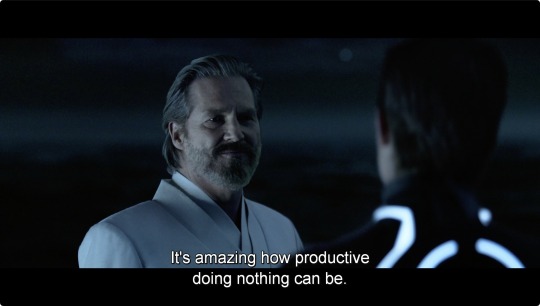
So, I have this weird habit: I am fascinated not by perfect stories, but those that start well and fall apart for no particularly good reason. I remember seeing Atlantis: The Lost Empire in the theater and being carried away by the efficient setup in the first 20 minutes, only to hit a point when things slow down and thinking “wait, when did this suddenly start to suck?”

I hear ya Vinny. I’m bored too.
The problem, as story theorists know, is second act trouble. It’s that problem of the long middle of the story where initial enthusiasm fades, attention drifts, and momentum fails.
Well, that’s what it does when you’ve got second act trouble, anyways. Obviously, some movies/games/shows don’t have this problem, because they don’t have a defective second act. Nobody in 1977 came out of Star Wars saying “man, that stuff on board the Death Star went on way too long.”
Anyways, let’s define our terms. Three-act structure splits the story into three parts:
Setup — Introduce the characters and the situation. An inciting incident gets the ball rolling, ultimately leading to the first plot point, where an irreversible change occurs and the conflict begins.
Conflict — The protagonist attempts to achieve their goal, dealing with a progression of complications that arise naturally from each of their actions along the way. Eventually, this leads to the second plot point, at which the back-and-forth of the main conflict cannot continue, and a conclusion (for good or ill) must be reached.
Resolution — A new, final conflict ends the story, with the protagonist succeeding or failing (or, sometimes, a combination of both, like discovering the thing they originally wanted and have now attained isn’t what they actually need).
Thing is, these aren’t divvied up in tidy one-third portions. In practice, the acts are in more of a 25%-50%-25% split, or 20-50-30 if you go by the Scriptnotes podcast’s t-shirt. Author K. M. Weiland has an extraordinary site for story theorists that breaks all the key moments (or beats) of this structure into blogs, podcasts, and compilation books.
So, after seeing YouTube videos of the cool new Tron roller coaster at Disney World, I was reminded of 2010's Tron Legacy, the would-be franchise-relaunching, torch-passing, sci-fi film that basically did none of those things. It's another film that I remember deflates about halfway through, so I thought it would be worth a rewatch to see where it goes wrong.
This being a sequel to 1982’s Tron, you’d figure some the audience would need a reminder of the first film, since it had been been 28 years. You could just watch the first movie, but… surprise… Disney let it quietly go out of print in the year or two prior to the debut of Tron Legacy. Corporate incompetence? I’d argue quite the opposite: whatever you think of the original Tron, it’s not as good as you remember. To modern eyes, it’s clunky, talky, and slow, and certainly can’t coast on the power of its dated special effects. Chance are, if 2010 audiences could have gone back to watch Tron, they’d have been less likely to get tickets to Tron Legacy. Which is why I think Disney drained the retail market of Tron DVDs on purpose. After all, they were perfectly happy to issue a Blu-Ray of "Tron: The Original Classic" once Legacy had finished its theatrical run and got its home media release.

Come for the space frisbees, stay for the Wendy Carlos soundtrack that you remember from the arcade game.
So, instead, Tron Legacy opens with a scene of a digitally de-aged Jeff Bridges — well, a digitally de-aged back of Jeff Bridges’ head — reprising the character of Kevin Flynn, the protagonist of the first movie, a coder who went inside the computer called “The Grid” to defeat evil programs. He tells his son about how he fought alongside the heroic program “Tron”, and created another program named “Clu” to care for The Grid in Flynn’s absence. That’s basically everything you need to know from the first movie. All the other details — Sark, the MCP, Yori, Dumont — none of it matters. See how much time you saved by not rewatching it?
Next scene: info-dump. A news story reports Kevin Flynn’s disappearance, as it plays out over footage of the lonely, and increasingly troubled young Sam Flynn. It moves fast enough, and it’s fine for what it is.
Now, though, we are six minutes into the movie and don’t really know the protagonist. A 10-minute action sequence takes care of that. With an implicit timeskip, we see the young adult Sam speeding on his motorcycle, escaping the police, and breaking into the corporate tower of his father’s former company, which is having a board meeting to announce their new operating system. This is one of the already-dated bits of Tron Legacy: the now-evil version of ENCOM is a pretty obvious expy for Microsoft, as it prepares to launch its new operating system with a high new price tag and no new features.

When Apple did this, they called it “Snow Leopard” and everyone thought it was great. Shouldn’t we cut ENCOM a break?
I don’t think this bit lands today like it did just 13 years ago. People under 35 don’t recall Microsoft’s cutthroat monopoly days and mostly just know Microsoft as the Xbox company, not that different from Sony or Nintendo. An evil computer company today would probably be portrayed as directly creeping on its users, like Google or Facebook, or perhaps an Apple-style aesthetic dictatorship. Maybe with an Elon Musk caricature because, man, that dude is creepy.
As the board meeting continues, Sam sneaks into a server room and starts hacking, narrowly avoiding a security guard. As the board goes to launch their new OS, Sam’s hack reveals itself as a looping video of a barking dog, despite the “world-class security” claimed by the company. Better yet, Flynn’s last remaining loyalist at the company, Alan (the creator of the original “Tron” program), discovers that Sam’s hack has released the OS for free on the web.
At the top of the building, the security guard reaches Sam as he stands atop a crane. Sam, as the main shareholder in the company, justifies his hack as stealing from himself… then jumps off the building. Halfway down, he opens a parachute to complete his daring escape… except that he gets caught in a traffic light on the way down and the cops catch him.
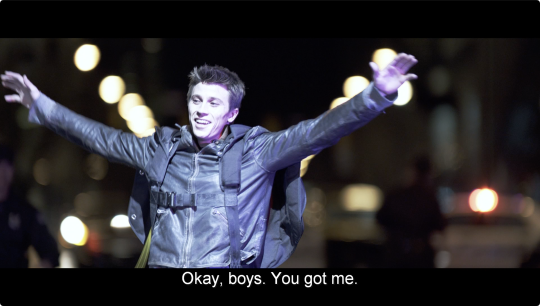
Fifteen minutes into the film and Garret Hedlund is almost effortlessly charming. Pity it doesn’t last.
After bailing out of jail, Sam returns to his home — a makeshift bachelor pad built of stacked shipping containers — to find Alan waiting for him with news: Alan received an alert from a pager left to him by Kevin Flynn 20 years ago. From a long-since disconnected number.
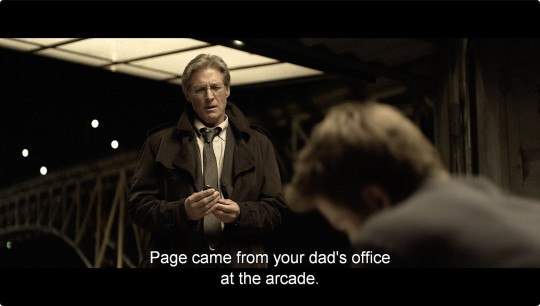
Bruce Boxleitner has such a low-key charm, it’s a shame we didn’t see him in more stuff. Although now I’m sure you’re all going to tell me to watch Babylon 5, aren’t you?
Sam laughs off the idea that his father is waiting for him at the old arcade, but eventually rides over to check it out. Finding a secret room behind the “Tron” machine, Sam discovers Kevin’s office, and after a few ill-considered commands at the terminal, he gets zapped into The Grid.
So, in 20 minutes, there’s Act I. The essentials, from a story perspective:
Protagonist: Sam Flynn, genius hacker, prankster, lost-boy-without-a-father-figure trope.
The hook: Can Sam figure out what happened to Kevin Flynn all those years ago, and find him? And could doing so set things right both with Sam and the company?
The inciting event: Alan receives a page from Flynn’s pager, and lets Sam know.
First plot point: Sam is zapped into The Grid, the world inside the computer.
All told, this is really good. The movie efficiently gets us on board with a fun, exciting protagonist, and gives him a compelling purpose. You’d figure we’re in for a good time at this point.
(Reader, we are not in for a good time.)
OK, so Act II. There’s lots to do in the second act — it’s half the running time after all — so it’s helpful to break it down more granularly. Weiland writes, “[the] first half of the second act is where your characters find the time and space to react to the first major plot point.” Since the plot point was getting zapped into The Grid, it makes sense that the reaction — Sam’s first order of business — is figuring out where he is and what do to do. So we start with a five-minute sequence of Sam immediately being captured by the authorities, outfitted with his Tron-land uniform and identity disc, and brought to the game grid.
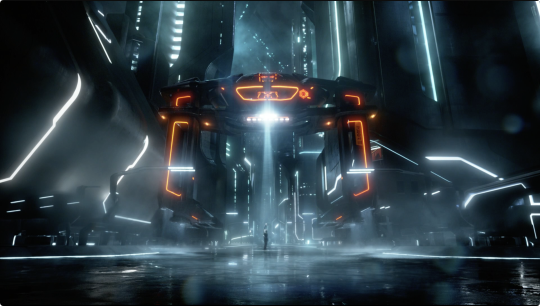
I hadn’t realized until this rewatch that Sam being pinned down by the Recognizer’s searchlight is a callback to when the police helicopter gets him back in Act I.
From here, we go into what everyone expects from the Tron movies: the videogame stuff. Sam immediately ends up in “Disc Wars”, the gladiatorial death frisbee from the first movie, albeit with updated effects. Using his innate athleticism and cleverness, he survives to a faceoff with the champion Rinzler, who wounds Sam and realizes from a blood drop that Sam is not a program, but a user. A mysterious figure lording over the games demands that Sam be brought to him.
As Sam is ferried up to the throne room, the mysterious figure reveals himself as the spitting image of the 35-year-old Kevin Flynn. Sam greets his dad and insists they go home, only to be told the leader isn’t Kevin Flynn after all. Sam realizes that this is Clu, a program that Flynn created (owing to the Tron convention that programs resemble the person who created them).

The convention of programs resembling their “users” also speaks to the mainframe-era idioms of the original Tron, when a user and programmer were one and the same, typically someone who wrote a program to solve computational problems for themselves.
Clu sends Sam back out to the game grid, presumably to die in combat in the lightcycle game. So, shut off your brain, we get another zippy five-minute action sequence. It’s playing out just like the original Tron at this point in the second act, arguably better because Act I established Sam’s motorcycle skills, so the lightcycle action sequence and his success in it is actually motivated by his character.

40 minutes in and he’s still charming. If only it had lasted.
Despite being outgunned by opponents with better equipment, Sam leads his team and puts up a solid fight. Eventually though, dirty tricks kill off his compatriots, leaving Sam with a wrecked bike and facing certain doom at the edge of Clu's outstretched disc. Suddenly, a four-wheeler bursts onto the grid and rescues Sam. The driver wrecks most of the pursuing lightcycles, then blasts a hole in the arena to escape to a barren outland beyond the grid, where the pursuers’ vehicles can’t operate. Removing her helmet, the driver introduces herself as Quorra, promising that Sam’s questions will be answered in due course.
Things slow down as the car weaves its way through hidden passages to a secret lair. Quorra brings Sam inside an elegant home, where a solitary figure resides in a seated meditation.
For those of you keeping track, the Blu-Ray is at 48 minutes, 30 seconds, and the movie is about to fall apart, though we don’t know it yet.
We’re now approaching the midpoint of the second act, and thus, the midpoint of the movie itself. This is a separate phase of the second act, one that is uniquely situated to keep the story from flagging. That is, if you actually do something with it. As Weiland writes:
The midpoint is what keeps your second act from dragging. It’s what caps the reactions in the first half of the book and sets up the chain of actions that will lead the characters into the climax. In many ways, the midpoint is like a second inciting event. Like the first inciting event, it directly influences the plot. It changes the paradigm of the story. And it requires a definitive and story-altering response from the characters.
So, a good story probably wants to do something big at the midpoint, something that changes the stakes, changes the conflict, and forces the protagonist to act. Revelations! Betrayal! Explosions! The good stuff!
Tron Legacy, by comparison, sits down to have dinner.
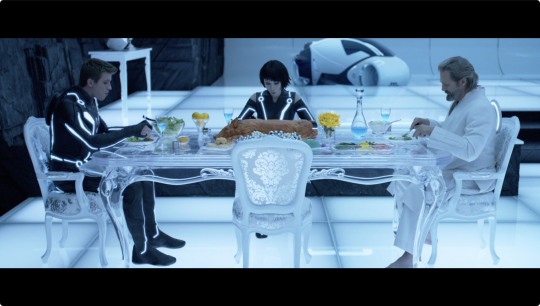
What’s wrong, Quorra? You haven’t had any of your uncannily realistic roast pig.
The reunion scenes with Sam and (Kevin) Flynn stretch out for about 15 minutes… a full one-eighth of the movie. It’s all dialogue, much of it while seated. That’s already tough to make dramatic. What’s even harder to chew through is a staggering amount of info-dumping:
Sam insists they leave the Grid together, but Flynn says it’s impossible.
Awkwardly, Sam and Flynn try to catch up over the lost years, but it turns to why Flynn didn’t return. Flynn explains the discovery of the “Isos”, isomorphic algorithms, a spontaneously-generated digital life form that could change the world.
As Flynn's story turns to flashback, Clu sees the Isos as a corruption of the perfect system Flynn created him to build, and stages a coup against Flynn. Tron (apparently) dies defending Flynn, who flees into exile to escape. With no one left to stop him, Clu commits genocide against the Isos, wiping them out in one stroke.
The portal between The Grid and the real world closes, trapping Flynn within. It can only be opened from the outside, meaning Sam’s entry has opened it.
Flynn suspects that Clu is organizing something, and that he wants the power of Flynn’s identity disc. Flynn reveals that he didn’t send the page to Alan, meaning that Clu must have done so, as a means of laying a trap to lure out Flynn.

Yeah yeah, I was around in the 80s. I remember “War Games” too.
It’s kind of a chore to get through all of this material. It’s good for the story to breathe after the action of the game grid, but 15 minutes is probably too much. And to be fair, this does meet one of the requirements of the midpoint: it changes the protagonist’s goals and actions. Sam realizes he can’t convince Flynn to come with him to the portal. Instead, as he explains to Quorra, if he can just get to the portal himself, then out in the real world he can delete Clu with just a keystroke. Quorra thinks about it, then gives him the contact information for “Zuse”, a program who can get anyone to anywhere. Sam takes this information, steals Flynn’s old lightcycle, and heads back into the Grid.
We are now at one hour, five minutes into the movie, and believe it or not, this is the last time in the movie that our protagonist will take action entirely on his own. But more on that later.
Sam meets a female program who takes him to the End of the Line Club to meet Zuse, through an intermediary named Castor. Meanwhile, Clu's forces find the lightcycle and trace it back to Flynn’s hidden lair. Sam negotiates with Castor (who turns out to be Zuse himself) for transport to the portal, but is betrayed when it all turns out to have been a trap and Clu’s forces crash in from above. This kicks off a big bar fight sequence — the first action in nearly a half-hour at this point — with Quorra arriving to help protect Sam.
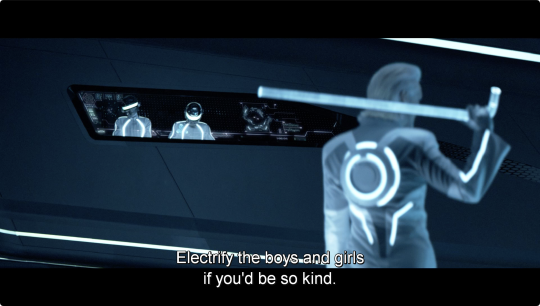
The Daft Punk cameo is a cute touch, since the soundtrack they created is quite likely the most enduring and best thing about the film. It’s a pity the Blu-Ray doesn’t have a music-only audio track, because then you could turn the entire movie into a two-hour Daft Punk music video.
The fight goes badly, with Sam overwhelmed and Quorra losing an arm to one of Clu’s goons before Flynn arrives to use his convenient god-like powers to turn the tide of the fight. He urges Sam to escape with the wounded Quorra to the elevator, but as they leave, one of Clu’s minions steals Flynn’s identity disc: exactly what Flynn has tried to prevent all these years.
Flynn and Sam steal a solar sailer and set off, Flynn reluctantly agreeing to Sam’s plan to make a rush to the portal. With the in-flight downtime, Flynn starts to use his magical user power to start healing Quorra. As Sam watches Flynn work, he realizes the truth: Quorra is an Iso, in fact, the last surviving Iso.
And this pause gives us an opportunity to bring up something about Tron Legacy: what is the point of this entire exercise? Ideally, a good story should have a theme that it expresses. The title gives us a hint: "legacy", things left behind by previous generations.
There's a really interesting idea when you think about it: Flynn basically has three children in this story:
Sam, his biological human son.
Clu, the program he created literally in his own image.
Quorra, his adoptive Iso daughter.
…and it doesn’t really do anything with that idea. Clu is motivated not by his resentment of Sam (or Quorra, if he’s even aware of her), but by his political ambitions to create a perfect world. Sam arrives to see Quorra living with Flynn and doesn’t for a second consider the idea he’s been effectively replaced by her in his father’s concerns and affections. If anything, the movie wants us to see a spark of romantic interest between Sam and Quorra, and if years of watching anime on Crunchyroll has taught me anything, it’s to never fuck your sister, even if you’re not blood-related.
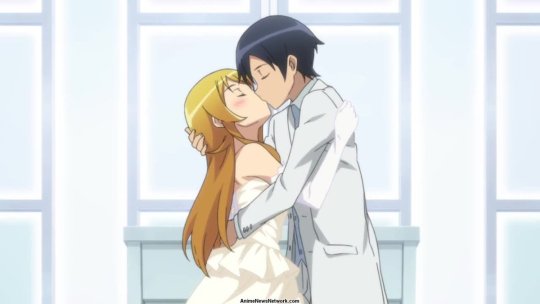
(Looks up suddenly, taps earpiece.) Uh, Wolf, I’m getting word that what anime actually says is to always fuck your sister. Back to you in Atlanta.
The scene of Flynn magically healing Quorra’s disintegrated arm also brings up what a missed opportunity this is. Between these three characters, they chose the least interesting option. To wit, could Sam heal Quorra? We’ve seen he’s got 1337 4ax0r 5k1llz back in Act I; does that give him magical abilities inside The Matrix The Grid? Do all users have that, or is it just Flynn?
Turn it around another way: what if it’s Flynn or Sam who gets injured. Can Quorra heal them? Flynn tells us that the Isos are these fascinating creatures who are going to reshape the real world, but we never see anything like that. Quorra is at best a quality Action Girl, but nothing she does in the story appears to have any relevance to her identity as an Iso. It’s another failure to “show, don’t tell”, in a movie that does an heck of a lot of telling to begin with.
Moreover, this sequence is taking us to the end of Act II. Citing Weiland again, this post-midpoint section is supposed to set up the protagonist for his or her final actions in Act III.
Because the second half of the second act will lead right into the slugfest of the climax, this is the author’s last chance to get all his playing pieces into position. We have to set up the line of dominoes that will knock into the final major plot point at the 75% mark, and we do that by creating a series of actions from the main character. Although he’s not likely to be in control of the situation, he’s at least moving forward and calling a few shots of his own, instead of taking it and taking it from the antagonistic force.
Tron Legacy has an even worse problem than the protagonist sitting back and taking it. Over the course of the last 10 minutes or so, Sam has been all but replaced as the protagonist by Flynn. Following the fiasco at the club, Flynn is the one driving the action (stopping the falling elevator in the escape from the club, healing Quorra) and providing all the information to drive us to the third act. Sam has been just going along with it, suddenly demoted to damn near sidekick status in the The Jeff Bridges Show Starring Jeff Bridges, with Special Guest Star Digitally De-Aged Jeff Bridges. Also appearing: Garret Hedlund and Olivia Wilde. And it's only going to get worse in Act III.
But before we get to Act III, there are two completely unnecessary scenes that drag even more momentum from a story that’s already at a virtual standstill:
Back at the End of Line Club, Castor/Zuse negotiates with Clu over Flynn’s identity disc. Clu coerces him into handing it over, then his minions bomb the club, killing Zuse inside. It’s now been almost 15 minutes since the breakout from the club, and the lead characters are long gone. Why should we care about Zuze? And if the point is to remind us that Clu is a cold-blooded murderer… um, I think we got that when he exterminated all the Isos.
On the solar sailer, Quorra tells Sam the story of how Flynn rescued her from The Purge that killed the Isos. She asks Sam what a sunrise is like, and he describes it in romantic terms as he briefly looks into her eyes. This could be a charming moment that lets the story breathe, if it weren’t for the fact that this whole second act has been largely sitting on its ass for nearly an hour.
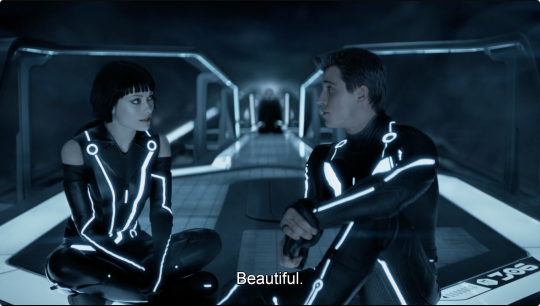
No. Just no, OK? Don’t even think it, Sam Flynn.
At one hour, thirty two minutes into the film, we now head into Act III. The solar sailer arrives unexpectedly at an industrial facility, rather than the portal. The trio finds barges of kidnapped, zombified programs, who they realize are being amassed into an army by Clu. As they skulk about the facility, Quorra gives her disc to Flynn and makes a run for it. While she's easily captured by Rinzler, her distraction allows Flynn and Sam to further infiltrate the facility.
Plot point two, in screenplay theory, puts an end to the the conflict of Act II and forces the conclusion that will play out in Act III. Here, it comes in the form of Clu’s speech to his army, in which he reveals his plan: he will use the army he has created and take it through the portal, using Flynn’s identity disc, to conquer the real world.
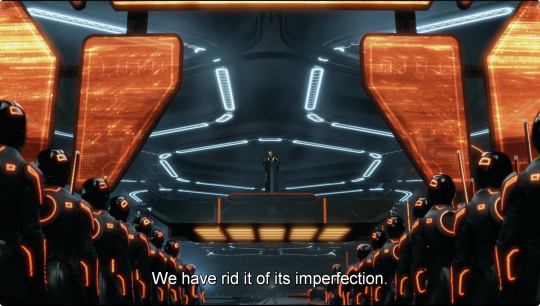
Straight-up Triumph of the Will here, because Hitler Is Bad is the easiest point in the world to make.
The conflict of the second act was Sam trying to get back to the real world, preferably with Flynn in tow. Now that they know Clu’s plan, they can’t just run away. They have a new goal: Clu must be stopped here, on The Grid. That’s what takes us into Act III.
Well, for what it’s worth of course. We burned an hour in Act II not doing very much action-wise, not doing anything thematically, and spending just a staggering amount of time in flashback info-dumps. The momentum has fizzled, and this movie wouldn't be saved by Act III even if it were great.
As it is, Sam and Flynn split up, with Flynn getting an escape ship ready while Sam makes an all-too-easy trip up to the throne room to recover Quorra and the disc. Seriously, Flynn’s disc is the most important thing in the world and you’ve got like three guards? It’s a pretty rote action scene that takes less than three minutes of screen time, and that’s with intercutting to Clu finishing his speech and reacting to an alarm when the disc goes missing.
As the trio take off in a stolen lightplane — with Quorra driving, Sam shooting, and Flynn calling the shots (because he’s all but the protagonist at this point) — they get chased by Clu, Rinzler, and their goons, basically replaying the lightcycle sequence, but now it’s flying.
And the thing about this is, the action doesn’t really lean on anything specific to Sam or Quorra that’s been established earlier in the movie. There’s one line about how Sam’s glider-assisted escape from the throne ship tower is a trick he learned a few nights prior at ENCOM Tower. But there’s nothing really thematically about Sam, who he is, what he values, how he solves problems — no “use the Force, Luke” moment — because the prior two acts never really set any of that up. So what’s left now is pew-pew CGI light show.
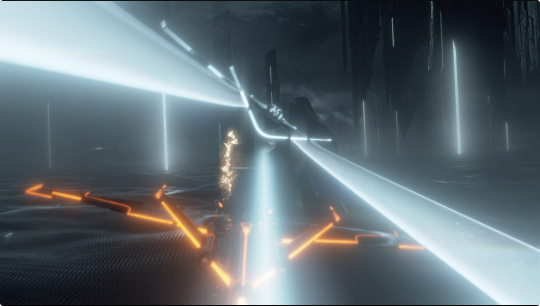
At least they should have gotten a good PS4 game out of this, right?
Dispatching the pursuers — including Rinzler, who turns out to be the corrupted Tron in a subplot that feels like it just barely escaped being left on the cutting room floor — the trio reaches the portal, only to find Clu waiting to confront them. So now, with Clu standing between them and their goal, does Sam take the role of the protagonist and vanquish the antagonist once and for all? Does he deliver the thematic truth, proving the righteousness of his world-view, and putting a bow on the whole point of the story?
What, are you kidding? No, of course not. Because this is Tron Legacy. Flynn does it instead.

If you squint, you can just barely see the putative protagonist, out of focus in the background.
Flynn offers a reconciliation; Clu rejects it Because Evil. After a brief fight, Clu retakes Flynn's disc, only to discover he's been tricked by a switcheroo and is holding Quorra's disc, while Sam and Quorra make their escape with the real disc. Clu attempts to stop them, forcing Flynn to use his Magical User Power to merge with Clu, seemingly killing them both, or at least reducing them to a little glowing light, which match-dissolves to Sam back in the real world, saving something (possibly Flynn’s data) to a USB stick.
After this climax, there’s just wrap-up bits of falling action in the real world to whip through before the credits. Sam finds Alan at the arcade, telling him to meet tomorrow morning at ENCOM Tower to retake the company. And we end with a cute shot — even if so much of the film doesn’t work, it is a lovely note to end on — of Sam on his motorcycle giving a now-human Quorra a ride and showing her the sunrise.

For the last time, Sam, do not bang your de facto stepsister.
So, what have we learned? I’d argue that the problems of the second act that doom the film aren’t just that not enough happens. That kind of audience-gets-bored-easily thinking is what gets us more dumb, loud movies. I think the problem of the second act is that it loses track of what the story was supposed to be about, if it ever had a point at all. The story raises a question of what would happen if the son ever finds his long-lost father inside the computer, but never settled on a good answer before they started banging out pages. And with no point to the whole exercise, there’s no natural pull of where the story should go. Perhaps it’s inevitable that Flynn ends up stealing the movie from Sam, because there’s no answer, no conclusion, that Sam’s story is working towards.
Still, the movie got one thing right: ORIGINAL MUSIC BY DAFT PUNK.
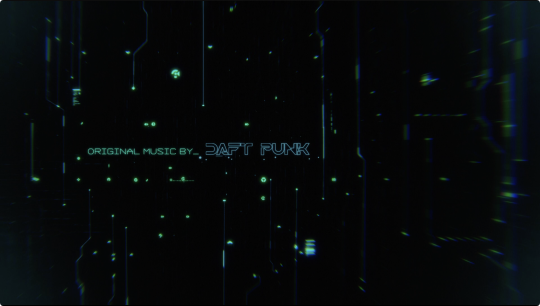
It’s a widely acknowledged truth that the Tron Legacy soundtrack is the best coding music ever created. As a software engineer, I can confirm.
4 notes
·
View notes
Text
Borderlands’ movie adaptation stars Cate Blanchett, Jamie Lee Curtis in sci-fi journey
Borderlands, the video game franchise that defined the looter-shooter genre, is poised to get its own cinematic universe — and it’s about time. All six base games in the series are well-loved by fans for their fantastical lore and quirky characters, who you better believe will be making their on-screen debut with director Eli Roth’s upcoming film adaptation of the franchise.
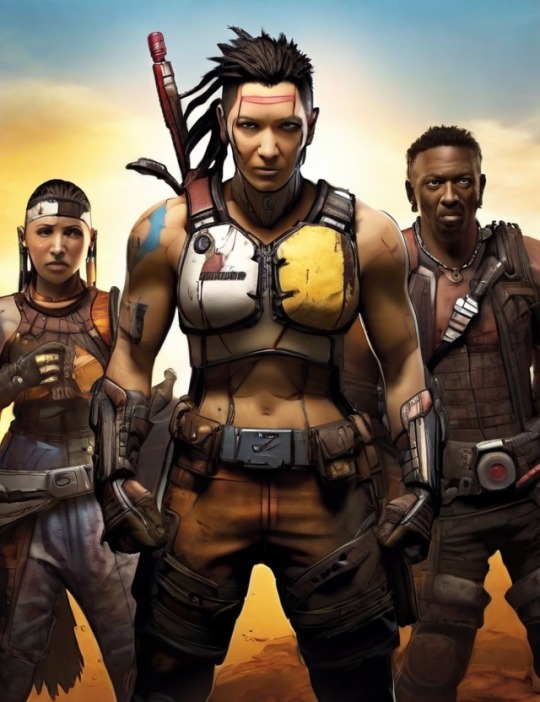
There’s still a way to go before the film hits theaters this summer. In the meantime, IGN sat down with Roth and Randy Pitchford, founder of Gearbox Entertainment and an executive producer on the movie, to talk all things Borderlands ahead of tomorrow’s first official trailer release.
And if that weren’t enough, IGN can also exclusively reveal the new poster for the Borderlands movie, as shown below.
From the way Pitchford and Roth interact, even on a video call, you’d think they were brothers. They both exude the same fun-loving goofiness that makes Borderlands, well, Borderlands. To me, this was best exemplified by the way the two creative continued to interrupt one another with comedic anecdotes about their time on set.
But jokes aside, the two mesh well on a professional level which bodes well for this video game adaptation. Roth was given extensive creative liberty on the project while Pitchford was on stand-by as a resource to provide deeper insight on the original series.

Obviously, it’s Randy’s baby, it’s his brainchild, and it’s everybody’s brainchild,” Roth said. “You’re stepping into a world that is so beloved and the fans are so hardcore that you think, ‘Okay, well, I really don’t want to screw this up.’”
Thankfully, Pitchford was open to pretty much everything. Roth recalled how Pitchford was even receptive to the idea of keeping Claptrap alive and entertained the Cabin Fever director’s various suggestions for how the robot might be able to expel bullets: “Is it like a tail goes up and… are they little rabbit pellets?”
In truth, it’s a blessing this adaptation was made, and it speaks highly to Pitchford’s faith in Roth as a director. Since the start of his career in the games industry, Pitchford said he’d been turning down requests to adapt his studio’s work into film. Ari Arad, who is now the producer of the upcoming Borderlands movie, came to Pitchford with several iterations of the script before the deal was sealed.
“Finally, we were playing League of Legends together one day, Ari and I. He was the support and I was the ADC,” Pitchford explained. “We were talking on chat, like on Discord, about the possibility of a movie while we were playing.”
(In an ironic twist, the Gearbox Entertainment founder clarified that he was playing as Caitlyn, who he says “was completely ripped off from Mad Maxi from Borderlands, by full comfortable admission of the Riot team.”)
From there, the two began to play video games together frequently, which gave Pitchford the confidence to finally sign off on developing a film adaptation of the Borderlands series. (So I guess business deals don’t happen on the golf course anymore.
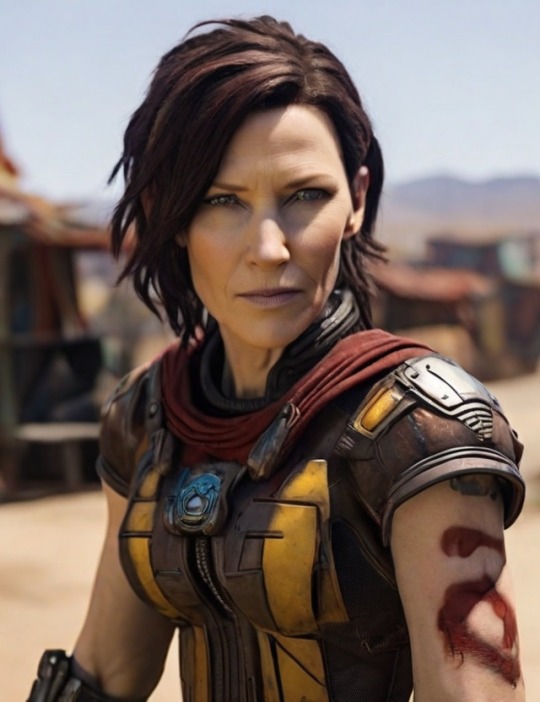
As in the game, the upcoming film will take place on the fictional planet of Pandora for an action-packed adventure featuring some of the franchise’s most beloved characters. In this all-new interpretation of the video game series, viewers will see the red-headed outlaw Lilith unite with a team of unlikely heroes to locate a missing girl who could change the fate of the universe.
“At a certain point you just have to pick, these are our characters, this is the story we’re going with, and let’s just make the best one possible,” Roth told me, reflecting on the decision-making process of what characters would appear in the upcoming film.
Because the movie is not canon to the video game series, the creative team behind the Borderlands movie had free reign to select from the unique cast of characters across the franchise — some of whom don’t appear until later games in the original storyline.
The film features a star-studded line-up of performers led by Academy Award winner Cate Blanchett as Lilith alongside Ariana Greenblatt as Tiny Tina, Jack Black as the voice of Claptrap, Jamie Lee Curtis as Tannis, Kevin Hart as Roland, Florian Munteanu as Krieg, and Gina Gershon as Moxxi.
Other additions to the full cast list include Edgar Ramírez, Bobby Lee, Janina Gavankar, Olivier Richters, Cheyenne Jackson, Benjamin Byron Davis, Charles Babalola, Steven Boyer, Ryann Redmond, Paula Andrea Placido, and more.
“I was like, ‘Find me the weirdest, gnarliest people. We’ll put them in the movie.’ And everybody, they loved it,” Roth said.
Roth and Pitchford shed light on what it was like convincing some of these actors to say “yes.” We obviously had to find out what made someone like Blanchett pull the trigger on a project like this, and the answer is, honestly, heartwarming.
In our conversation, Roth likened the Tár actor to one of the three greatest female performers in history. Their working relationship dates back to the director’s 2018 fantasy film, The House with a Clock in Its Walls, in which Blanchett starred alongside Black. So, when it came time to figure out who would be a fitting lead for the Borderlands cast, there was no doubt in Roth’s mind that the Oscar winner was the best pick.
“I think with me, she has permission to go a little bit weird and a little bit insane because it’s like, ‘Well, it’s Eli,’” Roth said. “It’s just like, ‘Let’s go have fun.’ But she’s obviously very serious about her character.”
For Curtis, the decision to join the cast was largely spurred by her gamer daughter, who is a fan of the Borderlands franchise, saying “‘Mom, you have to do this movie,’” as Pitchford recalled.
In Black’s case, the roots run even deeper. Back in 2012, he brought his son to E3 when Borderlands 2 was first being teased. Black asked Pitchford for a demo of the game, and the Gearbox founder told him that he would have to play Claptrap if a film adaptation of the franchise were ever to be made. The Nacho Libre star, of course, readily agreed.
“Whether you’ve played a Borderlands game or not, it’s a fun movie. It’s a really, really fun movie,” Pitchford said.
Borderlands will be released in U.S. theaters by Lionsgate on Aug. 9, 2024.
#borderlands#best movies#movies#showbiz#game#super#action#upcoming#borderlands 3#fun#fun movies#enjoy#excellent#current events#best#hollywood#so hot 🔥🔥🔥#amazing#actress#celebrities#social media#gaming movie
0 notes
Note
Fe, Fi, Fo, Fum, I smell the smell of a huge strawman..... This post was pretty obviously in response to my article "Do I think Cloud had feelings for Aerith?Plot twist: yes" The point of which wasn't, as should be obvious, to insinuate that all men are just walking penisses trying to fuck anything that moves. But that human beings are social creatures that naturally form bonds with all those around them, either positive ones or negative ones, and that doesn't mean they're all equally noteworthy.
It's kinda ironic to me that an article all about how feelings are a multi-faceted spectrum with different flavours and degrees and that not all fleeting emotions should be granted immense weight is being criticized by an argument that only makes sense if you treat every pinge of emotion as having great weight.
There is a reason the internet is filled with millions upon millions of images of beautiful women, and its because men like beautiful women. Does that means that they fall madly in love with every beautiful woman, or want to sleep with every single one of them and can't control themselves? No, and even if they did that still wouldn't likely be something reflected in the personality of a FF hero, it just means that the thought "she's pretty", is in itself already SOME miniscule form of romantic attraction. I think we can all agree that Zidane thought plenty of women were beautiful in FFIX without acting like his feelings for Garnet weren't special, nor different from what he felt in regards to random barmaids.
Aerith is plenty cute, and clearly the team is meant to like being around her. Even if you, the player, don't like her it's obvious that Cloud is portrayed to eventually warm up to her, even if she annoys him at first. And yes, I think that when a fun girl with a pretty face sticks it close to yours you will react to that is some way. Might be a 1 on a scale where your feelings for Tifa are 100. But it's just unrealistic to expect it to be 0, and that neither makes you a slut, nor makes the 100 you feel for Tifa any less valid, especially if it's during a time where you're not yourself.
Pretending Cloud has never had any fleeting thoughts about any other girls besides Tifa, even when braindamaged, is cute, but not realistic and just makes us come across as just as unhinged as the Cleriths. What matters isn't whether braindamaged Cloud thought Aerith was pretty, but what true Cloud desires, and chooses to desire, and for true Cloud this choice would not even be a choice, it would be Tifa, hands down, no competition. Tifa is the one he sees as "the girl I am in love with", Aerith he sees as "the companion that I failed", you can think someone is attractive, or even be flustered by them at times, and yet still have no interest in having a relationship with them, but just see them as "a friend" or some other role.
In fact, if anything that's exactly why most men CAN be trusted. The reason we're faithful isn't because we just happen to no longer be ever attracted to anyone else anymore after meeting you, which would essentially imply that we're just mindless beasts who aren't in control of our urges and our loyalty is but a happy coincidence. No, of course not, not anymore than me acknowledging that a cake is tasty means that I can't stop myself from eating it, or even WANT to eat it. I don't like cake, it's fatty and unhealthy and I don't want it despite the taste. The reason we're loyal is because we know that there are more important things, that feelings and urges are a complex chaotic sea of concepts and that without US there to define what they mean to us, what to nurture, and what importance to grant them, they are utterly meaningless. Cloud had mixed feelings for Aerith just like he did for Barret and the rest of his companions, and with Aerith some of those underlying emotions might be a mixture of finding her pretty, or being embarrassed when near her. None of that changes that at no point did Cloud ever contemplate replacing Tifa in his mind as the girl he wants to be with. Because that spot was reserved just for her, and was the result of Cloud sifting through all his emotions and deciding that THAT mixture of feelings was the mixture that represents the feelings for the person he wants to spend his life with.
What's your opinion on this: Cloud must have had feelings for Aerith because he is a man and men can have erections when they are around any woman? I saw an essay by a Cloti basically said some shit like that lol
I sent you an anon before this one, this was in the essay I mentioned that I read from a Cloti lmaoooo
I think that's like saying any man on the street is attracted to every woman he sees because she's a woman, and let's never take into account personal preferences, sexualities or moral standing.
That's like saying you can't trust any man because he's just a walking dick and will put it anywhere.
So, I guess they think Cloud is as much of a slut as they think Tifa is 😬
8 notes
·
View notes
Text
none of you are ready for my super hot take of infp ronan lynch
#its literally all there girl#first of all he's Fi defined like. obviously#his Ne is all over the place we're not gonna touch that LMAO but heres the most important part#his Si is so goddamn evident who cares if he races and drinks that boy lives!! in!! the past!!!#im sure his Te fits in somewhere i dont remember how hes like under pressure lol i need a reread#cause sure you can interpret his Racing and Stuff as a need for stimulation from external sources but i think thats just depression#thats not Se. thats mental illness#his Si comes 10 times more instinctual#you know who Really is an isfp?? blue.#anywayuahdhsnd#n#ronan lynch
2 notes
·
View notes
Note
in love with the fact the Halloween costumes haven't left (and Hunter's still in his wolf shirt). you'd think the crew would have them change into clothes more tonally appropriate for trying to stop the end of the world and having breakdowns and emotional conversations and personal revelations and catharsis but NOPE. sometimes scary/important shit happens when you are unprepared and aren't dressed for the occasion and you gotta deal with it!! unironically love that. they're KIDS, MAN!
I am so grateful honestly because their costumes fucking SLAP!!! Not an ugly fit in sight. And you're right, it really emphasises just how young and carefree they really are. Just a bunch of silly kids who who were torn away from their silly Halloween party and unexpectedly thrown into this madness.
Because I'm Like This, I've also been thinking a lot about the symbolism of their outfits since TTT aired. I'm probably reaching and none of this was unintentional but it's still fun to think about.
Gus, dressed as Captain Avery, the protagonist of the awesome Human Realm book that helped him cope with missing his Dad. The book with the line "We'll find a way back. We have to." A line that apparently stuck with Gus enough that he immediately made the connection once Hunter said it. I like to think the resilient hopeful tone of Cosmic Frontier was something that helped Gus keep his spirits up.
Not to mention that it's Sci-Fi, something that is so distinctively human. Gus, the boy who has defined himself as a passionate human enthusiast, whose dream is to become an ambassador to their Realm, is gonna shine in the final episode wearing a symbol of all his enduring optimism and passion and imagination.
Willow is a peculiar case. She is, ironically, a girl who was once considered half a witch now wearing a big loud declaration that she is, in fact, a witch in full. And then some!! It's not in the same vein that Luz and Amity are dressed as magic girl-esque witches. Willow's got the whole ooky spooky cackling and spiderwebs kinda witch vibe. Well, to be specific, it's a bit of a witch/devil hybrid.
Like let's get it out of the way, she looks like Evelyn. The stripey tights, the jagged skirt, the fact that her costume was originally meant to be red, just like the witchy cutout that hung above them during the hayride. Although only the last episode will tell if anything is gonna come from this. Maybe it's just a coincidence. But I think it's very interesting that she's dressed as a stereotypical reflection of how the Human Realm views witches/demons. And then there's Belos, a human man who is defined by his black and white perception of witches as the scum of the earth. He believes they're wild, they're evil, they're dangerous, they're monstrous. Which, at first glance, doesn't represent Willow at all. But then FTF happens, and the viewer is reminded that Willow's magic can be unstable. That she can be dangerous. She can be monstrous.
However, there's also that little W patch on her arm, reminding us that she may be a witch but she's also a silly girl named Willow wearing a personalised Halloween costume. She's not defined by being dangerous. She's so much more than that. She's full witch Willow and she's going out with a bang.
Amity is dressed as Hecate, Azura's rival turned friend turned heavily wlw coded best friend (I guess???), which obviously mirrors Amity's own role when the story initially began. There's a bit of significance linked to the Azura books and what they mean to Amity. Namely, from Lost in Language, when her chilly exterior began to crack. Her secret hideaway in the library was discovered, which acts as a representation of the person that she really is, but desperately tries to hide. And, on full display, was the Azura books. She had all but one, which Luz allowed her borrow. The missing piece that set Amity's whole motivation to change into motion.
That book was the tentative olive branch between her and Luz. And, with Luz's influence, it kickstarted her journey into becoming a better person, taking control of her own life, cutting toxic relationships, repairing others, etc. It's possible that Amity wouldn't be the kind and happy girl she is today without the Azura books. So, her diving into the finale while representing those books is very sweet. Also....I love her Hecate outfit. Its SOOOOOO pretty. The boots, the dress, the celestial aesthetic!!! Serve!!!!
I feel like I don't need to go that in depth about the significance of Hunter's costume. We all get it. He discovered Cosmic Frontier when he was struggling to come to terms with his status as a grimwalker, which severely clouded his sense of identity. Hunter not only connected with O'Bailey, but it gave him the opportunity to see a representation of a thing he hated about himself from a more empathetic perspective. Hunter accepted O'Bailey, Hunter loved O'Bailey, Hunter became obsessed with O'Bailey. The book was probably a big stepping stone in accepting himself. Hunter cannot ignore the fact that he's a grimwalker. He can't sweep it under the rug. But he can embrace it. As somebody who is tied to the legacy of Caleb Wittebane against his will, it must be comforting to feel like he can latch on to a cool space hero, rather than an anonymous witch hunter from 400 years ago.
Hunter's sense of identity is very important to his arc. So, the T-shirt is also very fitting. Hunter's gonna have his final confrontation Belos, who constructed him as a doll of someone else, while wearing the wolf T-shirt he personalized himself and a homemade O'Bailey costume. Because his name is Hunter and Hunter loves wolves, sewing and Cosmic Frontier.
And Luz....man. I feel like there's SO MUCH significance to Luz ending this story dressed as the Good Witch Azura and I don't even think I can do it justice. It's like....that's her. Azura means everything to her. It's shaped her into the person she is today. The Good Witch Azura is the reason Luz loves magic. And if Luz didn't love magic, she never would have stayed in the Demon Realm. It brought her closer to Amity. It's what inspired her to read and write and draw and imagine and create. It's an outlet for all her passion for stories. It was the thing that comforted her and brought her genuine hapiness during the darkest point in her entire life. It reminds her just how much Manny loved her. It reminds her just how much she loves Manny.
Luz is a character who is defined by all this relentless love and almost all of it can be linked back to Azura. Fiction, art, magic, family. She's a kid who has endured so much pain but she has such a capacity for appreciating the eccentricities of the world around her. She's full of light.
It's worth noting that Luz began the story having a hard time differentiating fantasy from reality. As such, using the Azura universe as a form of escapism was a little unhealthy. However, that's not the case anymore. Luz has matured into a much wiser person, but that doesn't mean she has to let go of her love for fantasy stories. She's found this perfect balance where she can accept the world as it is, while still being able to indulge in her storybooks in a healthy way. I don't think Azura will ever stop being an important aspect of her life.
Luz is carrying the memory of Manny with her until the finale. She's weird and she has always been loved for being weird and once this is all over, she'll keep being weird and she'll keep being loved for it.
181 notes
·
View notes
Text
You and I - Henry Cavill smut
The one where Henry comes over to fix your computer
Warnings: reader is a henry fan, pandemic theme, lockdown and quarentine-ing, little bit of second-hand embarrassment?, heatwave, henry is feeling deprived in this one, oral sex (f), masturbation (f), dirty talk, brief hairpulling, the name of God in vain, Henry’s monster dick, laughing and teasing while fucking, hand over throat but no actual choking, orgasm control, p in v, unprotected sex
Word count: over 3k, ‘cause I got no chill
A/N: this was inspired by a tik tok someone requested me to write a fic about it. Obviously I took it in a different direction because can I ever follow guidelines? No. I do love this fic, though. Thank you to @lokiscollar for giving this a read for me!

Y/N’s P.O.V
Driving to a secluded location to spend lockdown in felt like a wonderful idea. There was a working wi-fi connection, so I could work remotely from the seashore cabin without any problem whatsoever, and the view was obviously to die for.
I did not expect someone else to have the same idea as me. The cabin next door had been occupied on the same day that I arrived, and much to my surprise, I recognized my new neighbor as someone I never expected I’d come to meet in my entire life: an actor. An actor I actually had a crush on.
Thankfully, the situation didn’t exactly call for mingling. I ran off to hide inside my cottage as soon as I realized who he was, occupying myself with fixing everything for the next day instead of daydreaming about the man next-door.
There would be time for that later, once I got in bed. But weirdly enough, that was the only time I really thought about him during those first weeks of quarantine. Every once in a while I’d get the random wave of curiosity about what he was doing - what did Henry Cavill get up to while spending lockdown by himself? But that was pretty much it.
I woke up every day, had breakfast, worked and then went to bed. Sometimes I’d sit by the balcony and watch the birds fly, taking in the scenery and breathing in the salty water. Even as a kid, I’d always loved the sea. It was comforting, so it made sense for me to turn to it in such a stressful time.
Sometimes I’d hear a bark or two, reminding me of the man who was staying in the other cabin, and it made me smile. I always did like his dog, whenever I saw pictures of him.
I hoped they were alright and that the absence of any human contact wasn’t getting to them, even though it was getting to me. I could feel my own social abilities - which weren’t exactly stellar before - slowly becoming decrepit, and I was scared to think of what my first human interaction would be like once lockdown was over.
I just hadn’t anticipated it would be come so soon.
The morning began as it usually would. I took my shower, I had my breakfast, and I sat in front of the computer with my coffee in hands, ready to start working for the day.
Only the computer wasn’t ready for it, too.
“What?” I talked to myself - something that had become more usual the longer lockdown went on. “Oh, no, no, no…” The situation was looking drearier the longer I stared at my lifeless screen.
Looking up at the clock, I considered my options. Even supposing I could get someone to come to this middle of nowhere to fix it, there was no way I’d be able to get it done before work started.
Sighing, I pushed away from my designated desk to call my boss. Thankfully, he understood and I was left to repair the damn thing and come up with a solution for the next day.
My heart ached at the prospect of having to abandon my refuge because of an electronic malfunction. And that is, if there even was anyone willing to fix the damn thing, considering the pandemic and the rules of social distancing. That’s when suddenly, an idea popped up.
I remembered all the fuss a few months back over a video of Henry assembling a computer all by himself. There was no way someone with that much hardware prowess couldn’t at least know enough to fix this simple laptop.
With that thought in mind, I gathered all of my courage to leave my little shack and make my way to the neighboring cabin. I took a deep breath before knocking on the door, and after a few seconds of silence - he was probably surprised and certainly not expecting anyone - a voice sounded from within.
“Who is it?” Now, I had thought this through. If this man came as far as I had come to this damn forgotten town, it was because 1) he wanted peace and quiet and 2) he was as terrified of the virus as I was. So I knew what I needed to say - what I would like to hear if the roles were reversed.
“It’s your neighbor. My name’s Y/N. I’m so sorry to disturb, but my computer broke and I need it to work and you’re the only person I’m 100% sure has been socially distancing for long enough not to put my life in risk.” After all, I would have seen if someone had come to visit him. I didn’t need to say this because both of us knew it. “Would you pretty pretty please come and check it out?”
Silence followed my question and I sighed, rubbing my sweaty forehead as I knew this was a long-shot. “I understand if you’re unable or uncomfortable doing so, I just figured I’d ask. Thanks anyway!”
I had already turned my back to his front door when I heard it swinging open, the pitter patter of paws following close behind. My eyes took in the man in front of me for only a second before looking down at the dog at his feet, head tilted in interest as he analyzed me.
Immediately, my eyes lit up. “Kal!” I exclaimed, kneeling down to let the animal sniff me so I could pet it. My heart stopped working for a second when I realized what I’d done, though.
“Sorry!” I looked up at him from my kneeling position, trying to ignore how awkward it was, considering what I was close to. “I-I do know who you are, I’m not gonna lie about that.”
I straightened up as he kept looking at me in a way I couldn’t quite define. Neither could I determine how it made me feel, just that it made me avert my gaze so I’d stare at my feet.
“So… Are you gonna help me?” He chuckled at my question, closing the door behind him and taking a step in my direction, making me fumble as I instinctively stepped back.
“Sure.” It was the first thing he spoke to me, but we walked back to my own place in silence. He had his hands in his pockets as Kal followed us closely, his tongue hanging outside his mouth as he happily explored the outside for this little while. “Come on in.”
The way the cottage was set up left little space for him to wonder where he should be helping me. The desk in which I had prepared my set-up stood right by the wall to our left, and there he went without me having to point it out.
I watched a drop of sweat roll down the nape of his neck and fall under his tank top, distracting me as I licked my lips at the sight of it. Then his head turned to look at me and I realized that he was waiting for an answer to a question I hadn’t heard.
“Yeah, huh?” He chuckled again, making my face feel warm - an not (only) because of the overwhelming heat.
“Is it okay if I disconnect the wi-fi?” I wave my hand dismissively, shrugging.
“As long as you’re able to fix this, you can do whatever the hell you want.” I got the impression that I amused him, but he didn’t say anything else as he got to work on my (seemingly) dead computer.
Minutes went by of complete silence, safe from the sounds of typing and metal as Henry worked on the machine and I tried not to bite my nails. Finally, he pulled away from the screen and put his hands on his hips as if assuming some sort of decided stance - but if it was a good or bad thing, I couldn’t tell.
“Tell me, doctor.” I asked, pushing myself away from the sofa to approach him. The smell of a man’s sweat really had no right to be this arousing. “Is it life or death?” Henry turned to stare at me with a quirked eyebrow, and in the seconds it took for him to answer, I was once again distracted by just how hot he was.
“Sorry, what?” I asked when he became silent and I realized he’d asked me something I hadn’t heard once more. His smile said he was annoyed and entertained at the same time. “Sorry, you’re hot, it’s hot, and I can’t think straight,” I sighed, brushing the hair away from my eyes as I pressed my palms against them, trying to pull myself together.
“I swear to God, I’m not crazy.” I tried to look him directly as I said that, but was surprised at what I saw when our gazes met. There was a peculiar sense of yearning that he exuded, something I couldn’t quite place but that took my breath away all the same, especially when he took my silence as an invitation to invade my personal space.
“If you want me so badly, all you have to do is ask.” Silence fell heavily and I was out of breath just from his words - not a good sign. My throat felt dry, too dry, so I swiped my tongue over my bottom lip as I struggled to say something.
“W-why, though?” He tilted his head to the side, eyes inscrutable while he judged my question, trying to understand where it came from just like I was trying to understand his interest in me, when he suddenly smiled.
“I figured it’s a nice way for you to pay me back.” It took me a second to understand what he was referring to, and then my eyes darted from the computer to him, my mouth falling open in offense until he started chuckling. “I’m joking!” But even so, the question remained…
“Sweetheart…” He spoke, voice low and velvety as two strong hands suddenly enveloped my hips. “You’re seriously underestimating how hot you are.” I didn’t know what to say, so I had to make sure I’d hear him right.
“M-me?” A predatory smirk took over his face, slowly. I gulped under its intensity, feeling much like prey as he started to back me against the couch. I fell on top of it with a gasp, and another one escaped me when he used my ankles to pull me closer.
“I wanna eat you out.” It was all I got as an answer, but I can’t say that I minded it. As he dropped to his knees before me, pulling down my underwear before spreading my legs for his eyes to take in, it felt like I got a response from the gesture in itself.
“Do you know how long it’s been since I ate pussy?” The unexpected question made me choke on my own saliva, as he chuckled darkly in amusement at my bashfulness. I could only breathe through my mouth when he leaned down to run his tongue on the edge of my lips, slowly acquainting himself with my taste, making me moan softly.
“I-I definitely and decidedly don’t.” He seemed to like this answer, understand that it delimited exactly the type of fan that I was: the kind that knew what he was and what he liked - his dog, his computer - but not someone who was obsessed with his entire dating history, eager to know his every secret.
The longer Henry ate me out, the clearer it became just how long it’d been since he’d done this. It was obviously something he liked - the way he buried his face against my cunt and engulfed it entirely with his open mouth showed so. And the fact that he licked me and sucked me like he was a starved man? This was a man denied of a pleasure he genuinely enjoyed, that much I was certain of.
“Do you like this?” He asked once he inserted one of his thick fingers inside of me, already stretching me beyond what I could do with my own hand.
“How could I not?” I managed to moan a response, making him chuckle.
“Show me how to find it,” he instructed, eyes sparkling with determination. “I want to find your sweet spot.” I’d never had someone I was with so interested in giving me pleasure before.
Hypnotized, my fingers circled his wrist as best as I could, slowly moving him to run his digits over the top of my channel. He knew when he found it because I cried out for him, closing my eyes momentarily.
“Cum for me,” he ordered, and how could I deny him that, especially when he was looking at me with those darkened eyes? He milked my orgasm until my pussy had stopped clenching around him, but the second that it was done, he growled, getting up to his knees. “Gonna fuck you now.”
He pulled me by my hair, making me moan out loud as he slowly inserted his monster cock inside of me. “Oh, God!” His groan had me panting, cunt clenching around his thickness. I couldn’t understand how I was able to take it, but I was glad that was the case. “So… tight…”
Through his grip on my hair, he pulled me to deposit quick kisses down my jaw. “You take me so well, darling.” It was a compliment I was proud to receive, even though I wasn’t too sure how I managed to earn it in the first place.
“I honestly don’t know how,” I admitted, gasping when he slowly dragged his cock out to slam it in me, but I instinctively pulled my hips away, earning an amused chuckle from him.
“Come back here,” he ordered, already pulling me back to spear me with his painfully hard length. I’d have to be inhuman not to cry out at the feeling of his bulbous head bumping against my cervix. “Are you scared?” He joked as I bit on my bottom lip not to give in and laugh. “You think I’m too big?”
“You’re more than enough, I’ll tell you that.” Now, that had his own laugh escaping his chest, making my body tremble underneath his, inadvertently getting some friction between the both of us. It earned me a moaned out, “Yes…” that got his attention back to where I hoped it would be, and as his eyes settled on me, I briefly wondered if I was prepared for what was to come.
“But now that you got all of me inside of you, do you really want to go?” The whispered question made me shiver. I never expected him to be the type to talk dirty, but then again, I never expected I’d be fucked by him, either.
“No.” It was all the permission he needed.
“Then let me fuck you hard.” And hard he did fuck me. He was hard inside of me, it probably would have been painful for him if he wasn’t so desperately trying to alleviate it by frantically fucking me against the couch.
It was the most deliciously torturous experience I’d ever gone through. I had to bite my lip while I held onto his shoulders for dear life, trying to stop my moans from escaping because I was sure that for once, I’d become a screamer.
Unfortunately, it seemed like Henry didn’t appreciate my efforts to keep his ears from deafening. “What’s wrong?” He questioned, fingers tightening on my hips. “I thought you wanted this.”
Confused, all I could think to say was, “I-I do.”
“Then let me hear you,” he insisted. “You know you can scream all you want. We’re all alone up here on the coast.” Well, he wasn’t wrong. And with that reassurance, I allowed my head to fall back and my mouth to fall open, my moans flowing freely from my body as Henry kept fucking me.
“This is so much better than touching myself in search of a release,” he mumbled at some point, like he was talking to himself. “I was so damn lonely and you have such a tight little pussy.”
Being fucked by him felt like a religious experience. Henry somehow knew the map to my pleasure, easily bringing me to the brink of bliss before I had even managed to wrap my head around this turn of events.
My moans grew louder as I climbed higher and higher, but before I could fully tip over his hand curled around my throat, not constricting any air, just calling my attention.
“Ask for permission, baby.” Just the order had me clenching around him, prompting him to release a moan of his own. All the while, I was groaning in frustration, trying to control myself or say what he wanted me to say, but all that came out of me was, “Goddamn! You can’t say stuff like that.” Henry’s laughter flowed freely once more, making my heart skip a beat. “Why not?”
“Because you’re a fucking movie star and I am not up to fall in love with you.” That had his eyebrows raising in surprise, the smile disappearing from his face before it came back as a teasing smirk.
“Oh, so this is a one-time thing.” The taunting manner in which he said it surprised me in turn, so I hesitated before nodding. I mean, of course it was, right? He didn’t even know me. This was strictly sexual and physical, I would not be fooled by my own hormones. “My cock is not enough for you to want to get to know me some is that it?” … Was he testing me?
“Yes.” His smirk only grew at the word. “This is a one-time thing.”
“We’ll see about that.” His fingers ran down my body to graze over my clit. I sucked in a breath, trying to keep it in, knowing I was going to lose. Eventually, as my thighs began to tremble, I gave in altogether.
“Please, let me cum, please.” His eyes softened at my broken and desperate plea, hand gripping my cheeks as he finally nodded.
“Keep staring at me as you cum,” he commanded, still just as bossy. “Show me how pretty you look when you cream all over my dick.” That was all I needed to succumb to the pleasure he was subjecting me to.
I felt his cock, still hard as it pumped rope after rope of cum inside of me, and by the time I was able to open my eyes again, he was panting over me, sweat dripping from his forehead onto my face.
I didn’t have the time to think about what I should do - push him away, try to pretend this didn’t happen - because the second I began to adjust on the couch, he pulled me to rest against his chest.
“Let’s stay here for a little while,” he quietly asked me. “Then we’ll figure out if there’s enough room for me to take you in your bed.”
#my fics#henry cavill smut#henry cavill#smut#henry cavill request#henry cavill requests#my requests#henry cavill x reader#henry cavill reader#henry cavill reader insert#henry cavill reader inserts#rpf#fanfiction#henry cavill oneshot
1K notes
·
View notes